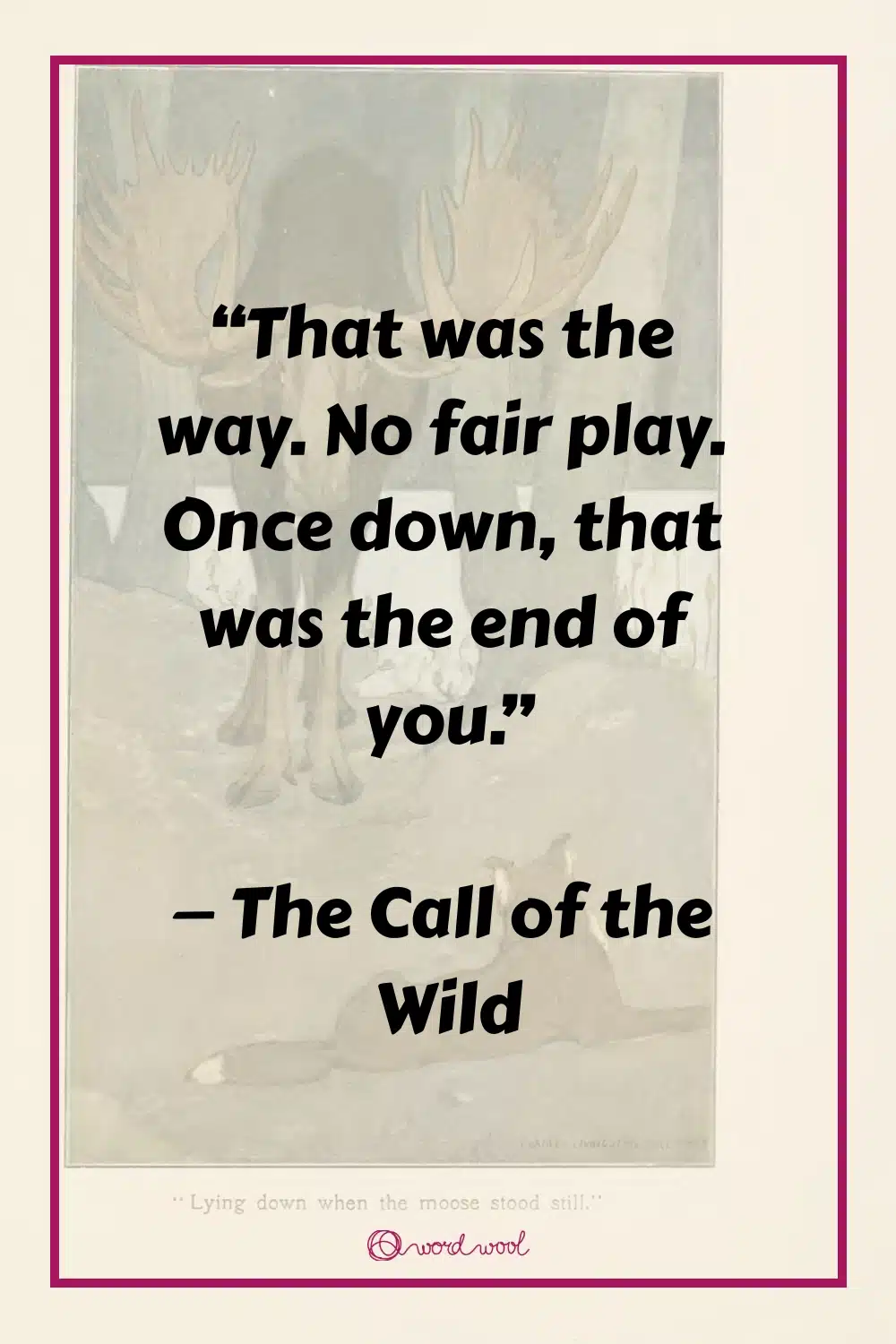Here are the 33 best handpicked quotes from “The Call of the Wild” by Jack London:
From “In their very great misery they had become insensible to the bite of the lash or the bruise of the club.” to “That was the way. No fair play. Once down, that was the end of you.”
So if you want the best quotes from “The Call of the Wild,” then you’re in the right place.
Let’s get started!
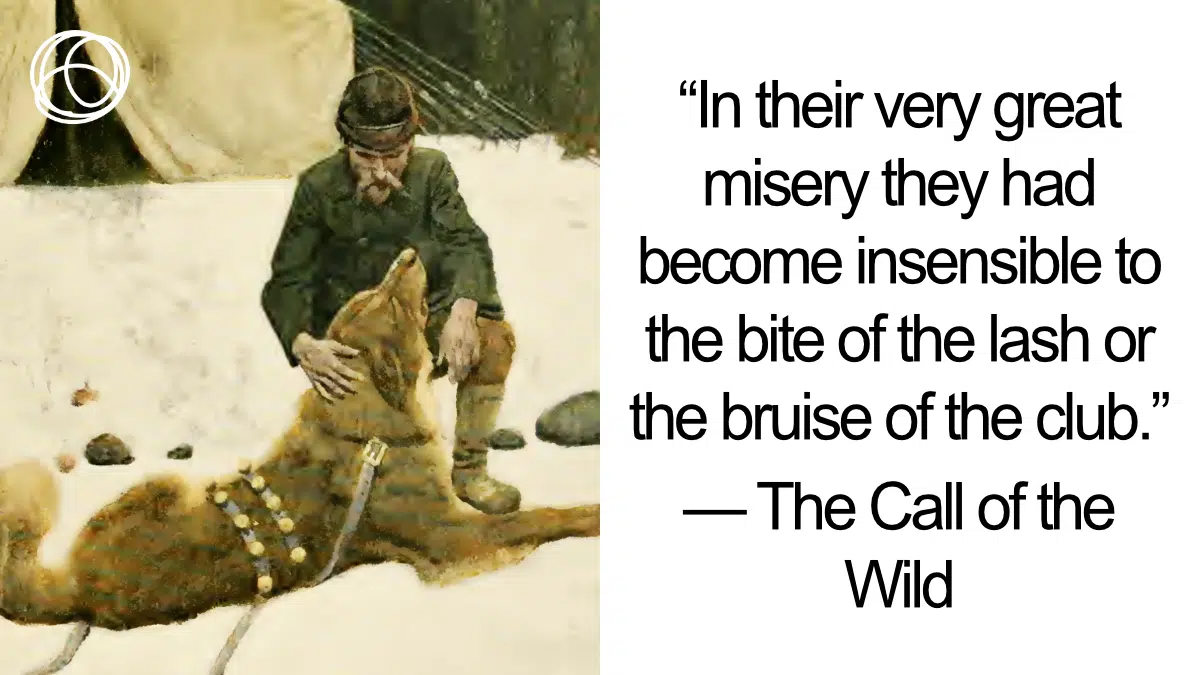
My Favorite “The Call of the Wild” Quote
#1
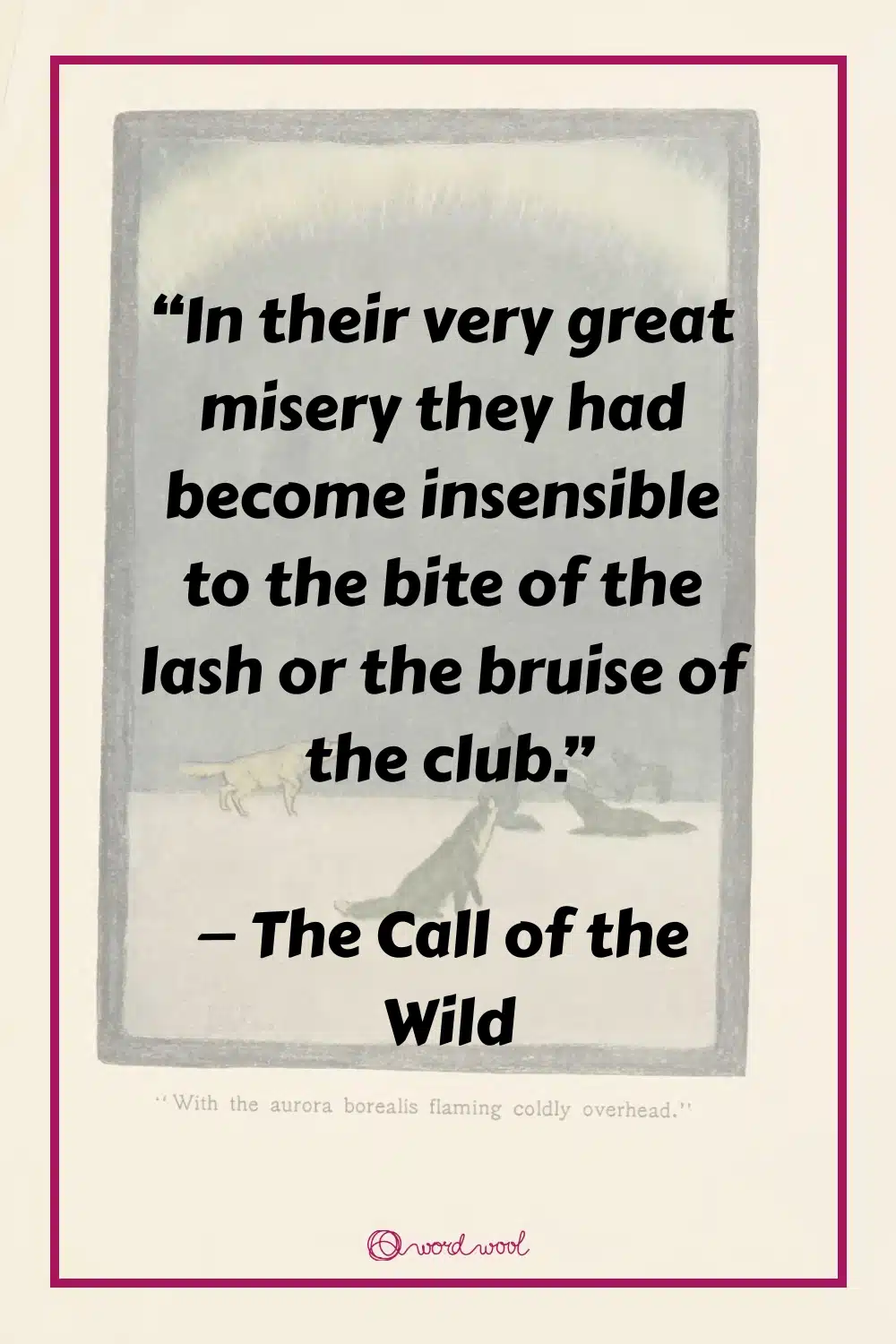
“In their very great misery they had become insensible to the bite of the lash or the bruise of the club.”
The quote above suggests that when a person has already endured so much suffering, there will come a point when pain does not sting as much as it once did; instead, it becomes a feeling they are not afraid to experience anymore.
I like this quote a lot because it shows just how capable the human heart is of enduring, to the extent that we become somewhat numb, so that even when faced with intense hardships, we remain relentless and as solid as land.
Lastly, through this quote, I’ve come to realize that people who are capable of adapting even to unprecedented painful situations are the ones who most probably have gone through heartbreaking moments that even time can never mend.
Best Handpicked Quotes From “The Call of the Wild” by Jack London
#2
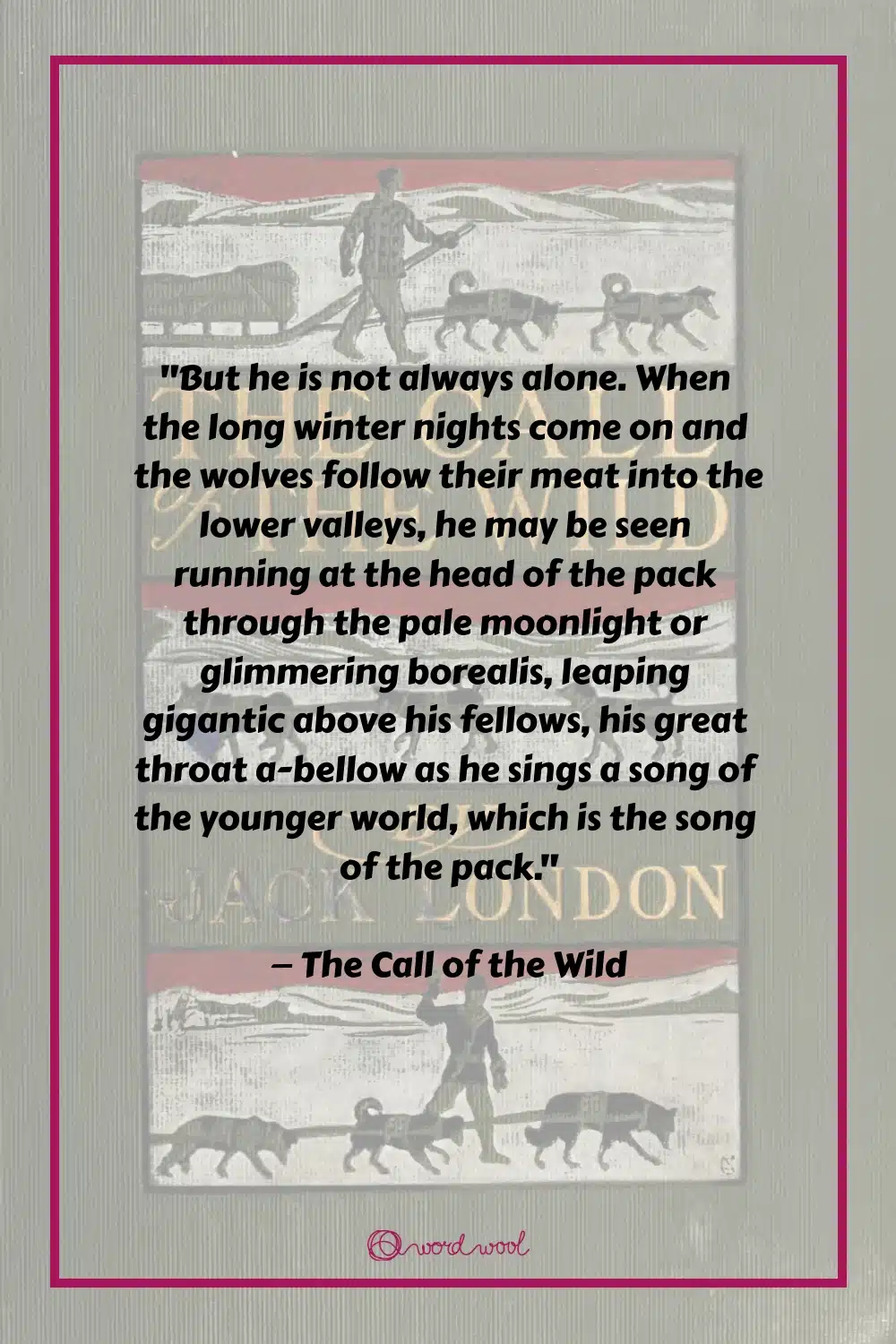
“But he is not always alone. When the long winter nights come on and the wolves follow their meat into the lower valleys, he may be seen running at the head of the pack through the pale moonlight or glimmering borealis, leaping gigantic above his fellows, his great throat a-bellow as he sings a song of the younger world, which is the song of the pack.”
— The Call of the Wild
#3
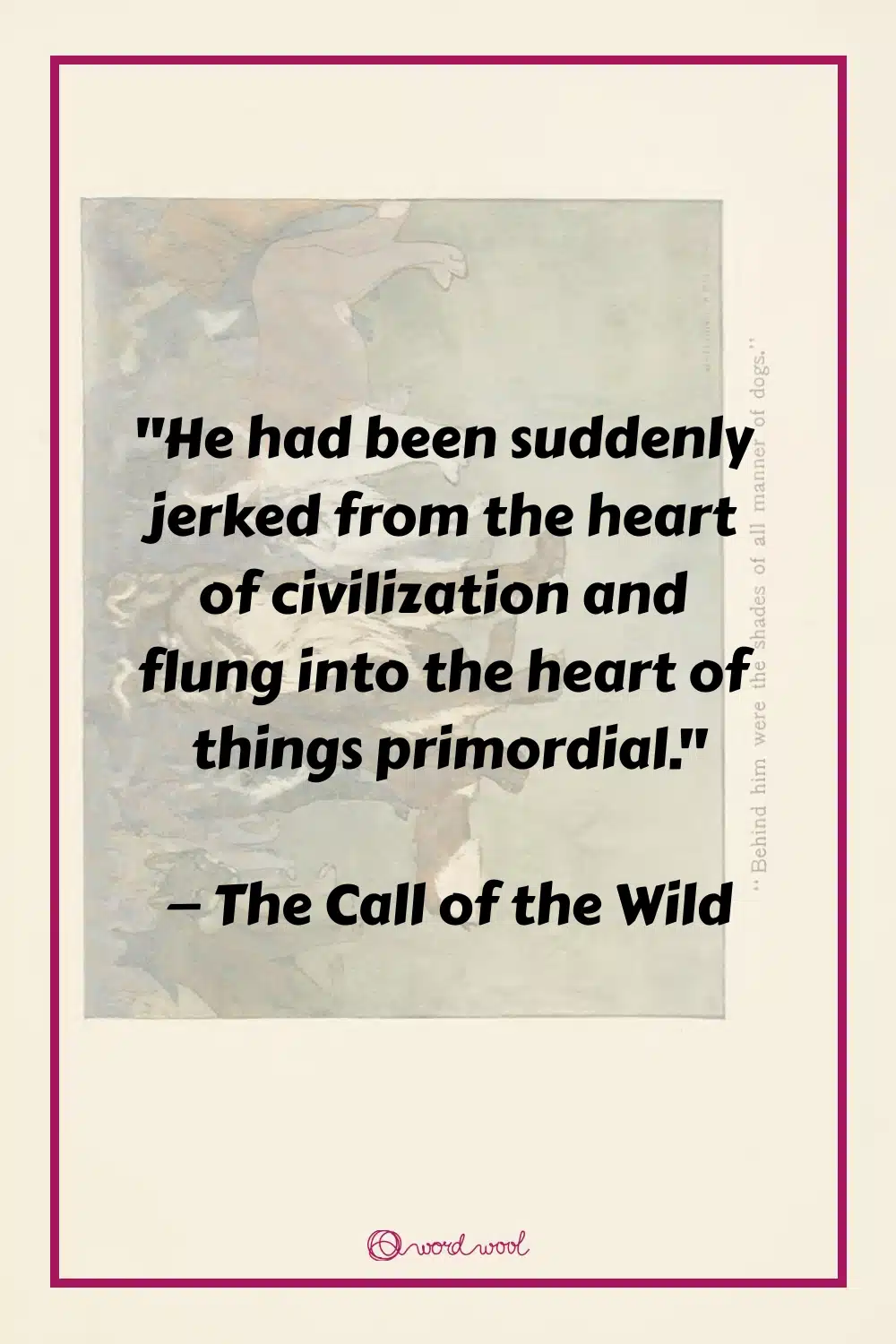
“He had been suddenly jerked from the heart of civilization and flung into the heart of things primordial.”
— The Call of the Wild
#4
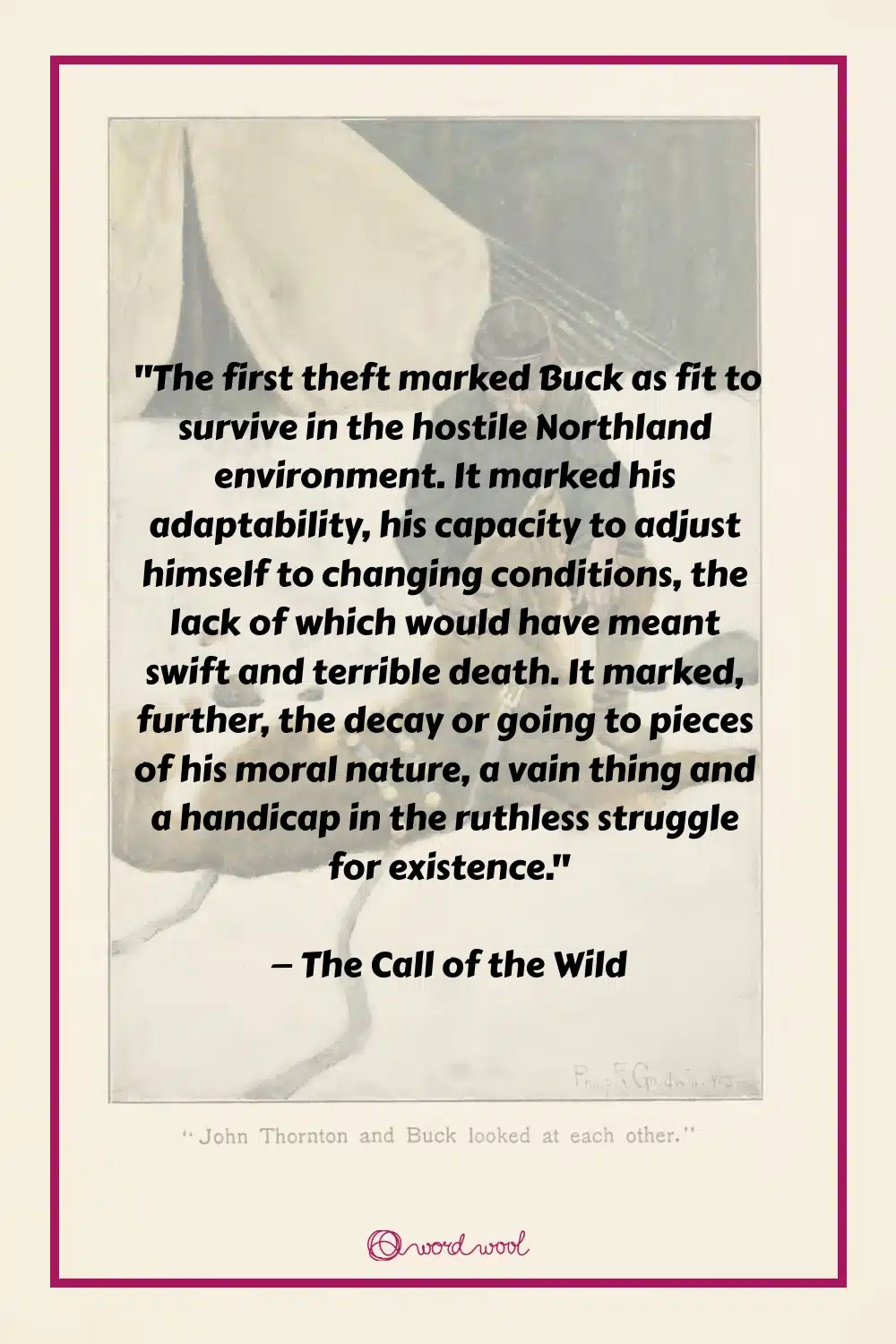
“The first theft marked Buck as fit to survive in the hostile Northland environment. It marked his adaptability, his capacity to adjust himself to changing conditions, the lack of which would have meant swift and terrible death. It marked, further, the decay or going to pieces of his moral nature, a vain thing and a handicap in the ruthless struggle for existence.”
— The Call of the Wild
#5
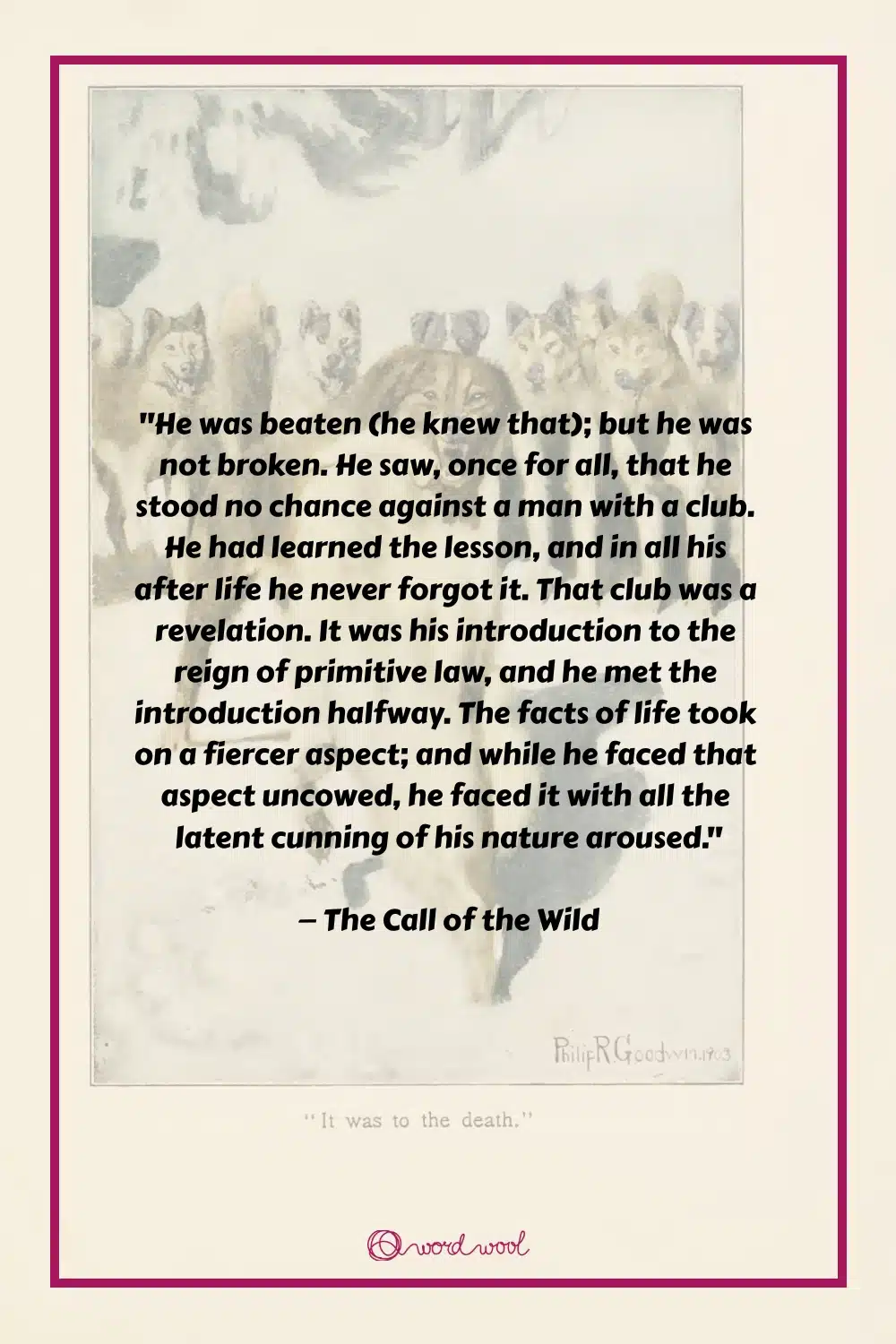
“He was beaten (he knew that); but he was not broken. He saw, once for all, that he stood no chance against a man with a club. He had learned the lesson, and in all his after life he never forgot it. That club was a revelation. It was his introduction to the reign of primitive law, and he met the introduction halfway. The facts of life took on a fiercer aspect; and while he faced that aspect uncowed, he faced it with all the latent cunning of his nature aroused.”
— The Call of the Wild
#6
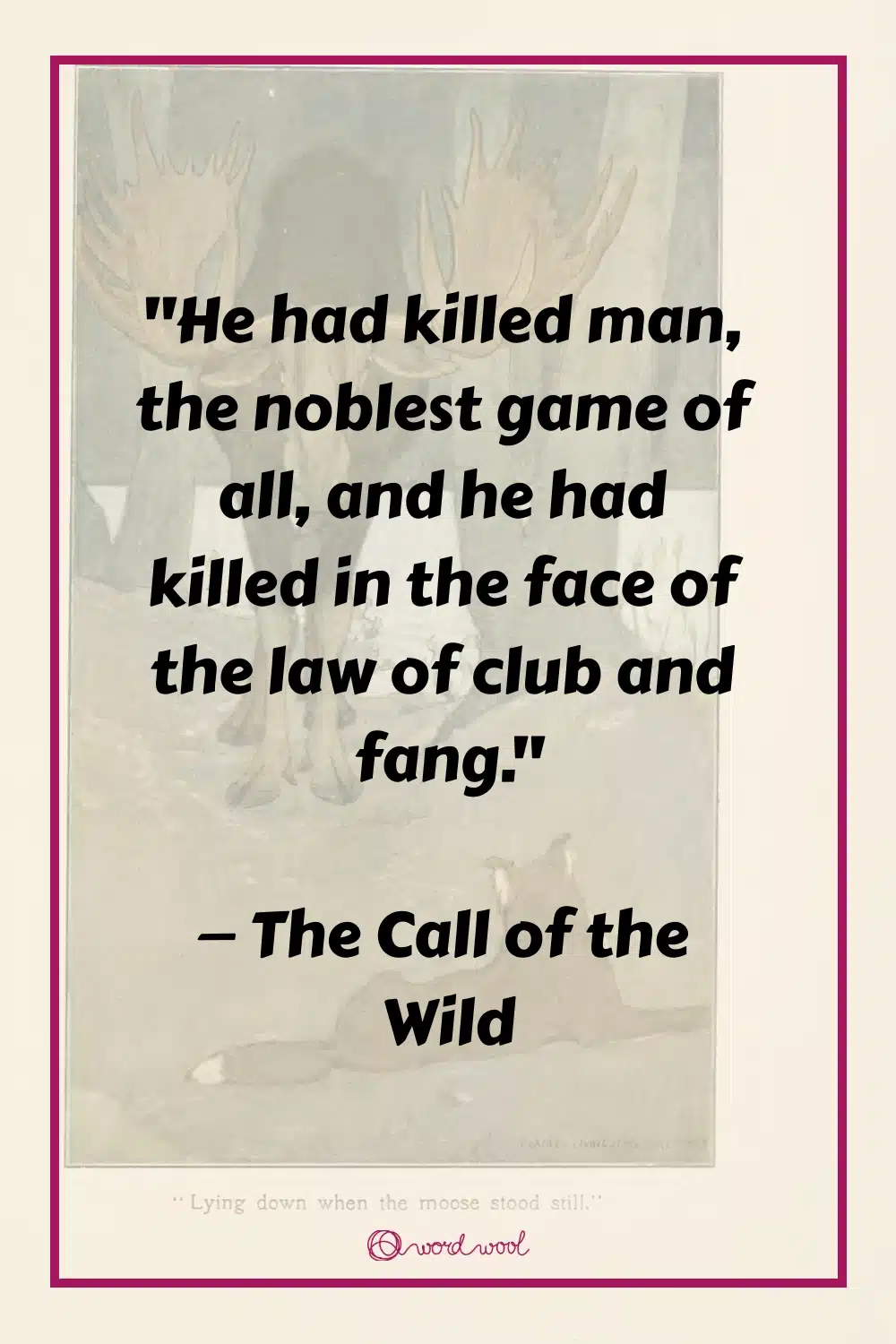
“He had killed man, the noblest game of all, and he had killed in the face of the law of club and fang.”
— The Call of the Wild
#7
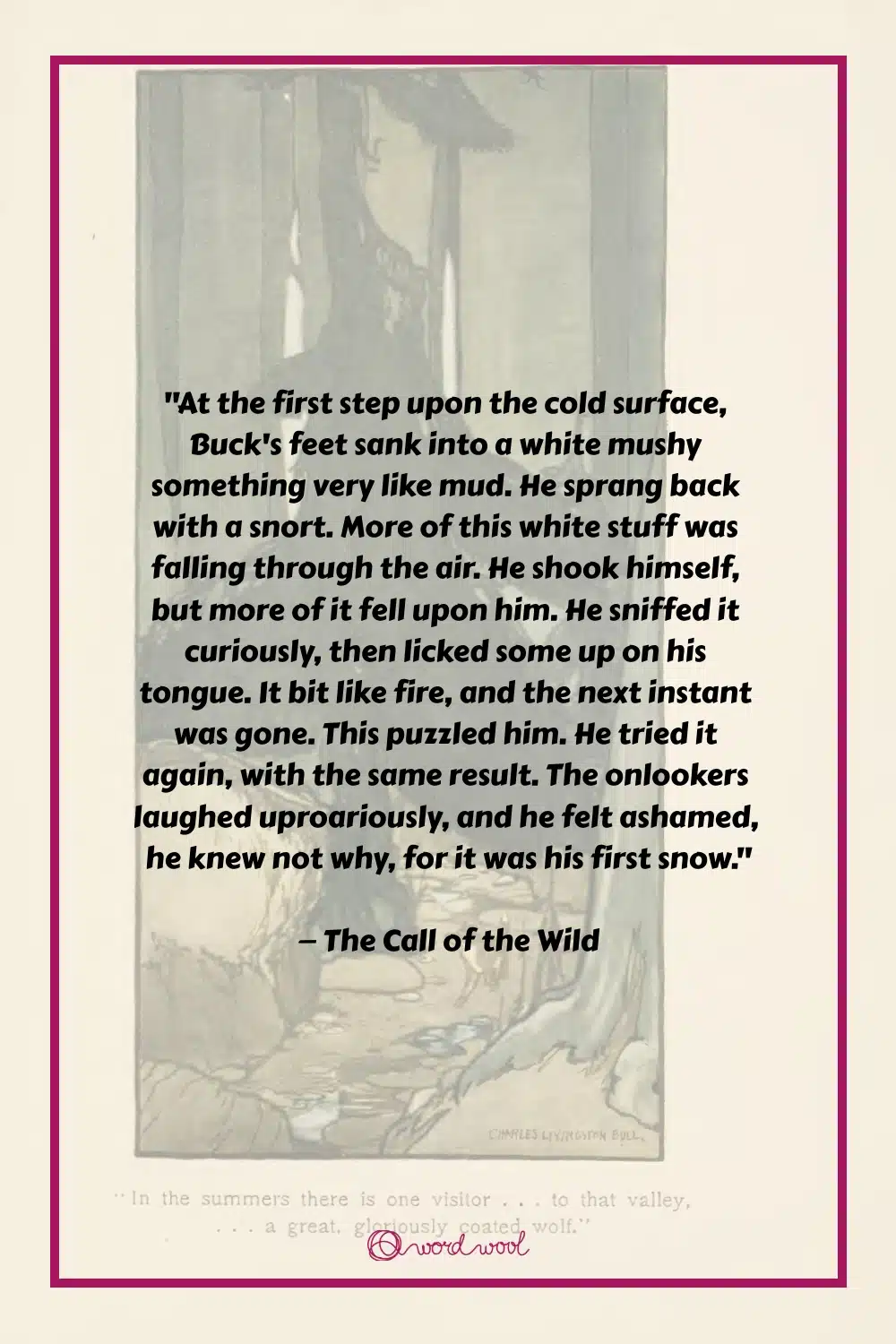
“At the first step upon the cold surface, Buck’s feet sank into a white mushy something very like mud. He sprang back with a snort. More of this white stuff was falling through the air. He shook himself, but more of it fell upon him. He sniffed it curiously, then licked some up on his tongue. It bit like fire, and the next instant was gone. This puzzled him. He tried it again, with the same result. The onlookers laughed uproariously, and he felt ashamed, he knew not why, for it was his first snow.”
— The Call of the Wild
#8
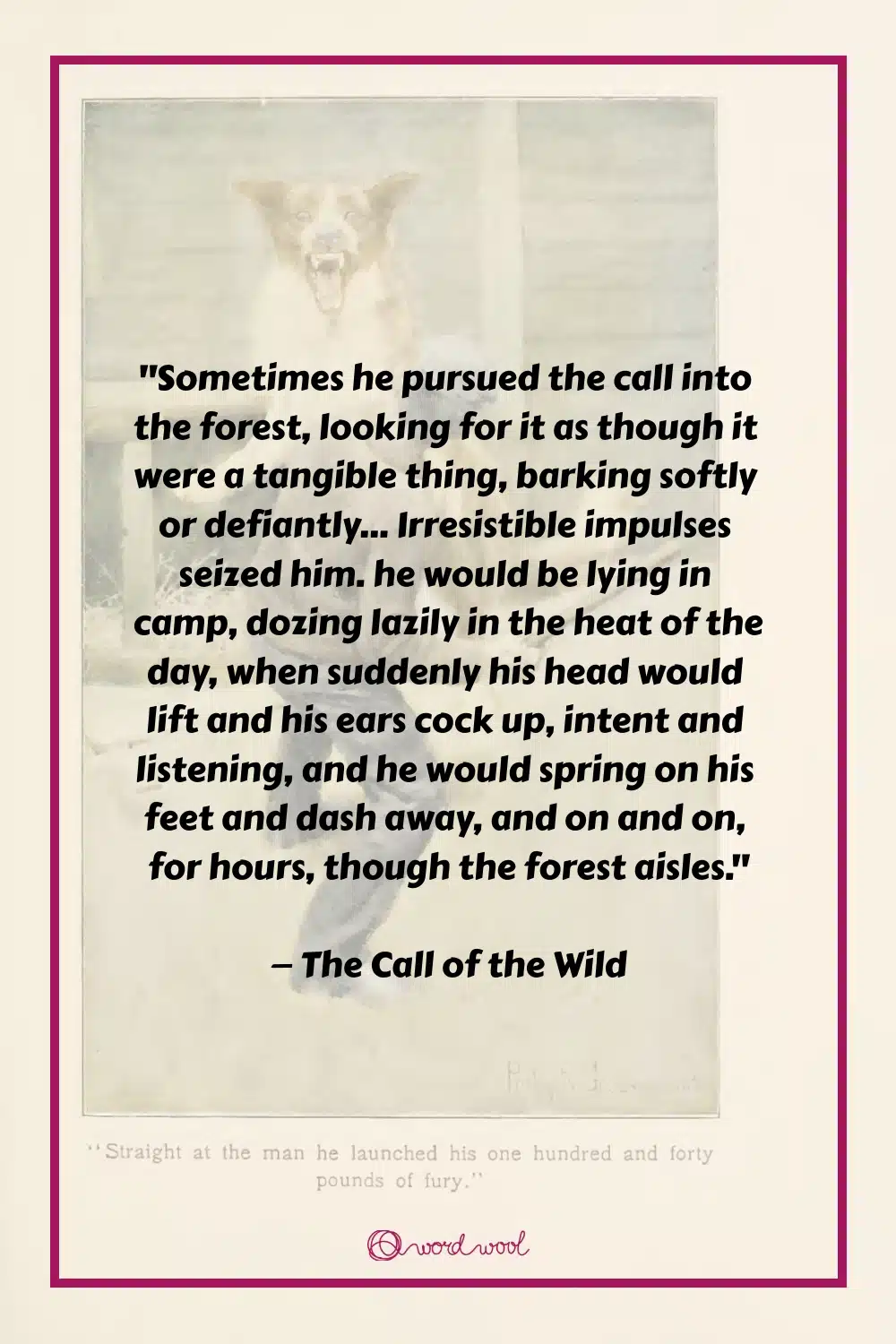
“Sometimes he pursued the call into the forest, looking for it as though it were a tangible thing, barking softly or defiantly… Irresistible impulses seized him. he would be lying in camp, dozing lazily in the heat of the day, when suddenly his head would lift and his ears cock up, intent and listening, and he would spring on his feet and dash away, and on and on, for hours, though the forest aisles.”
— The Call of the Wild
#9
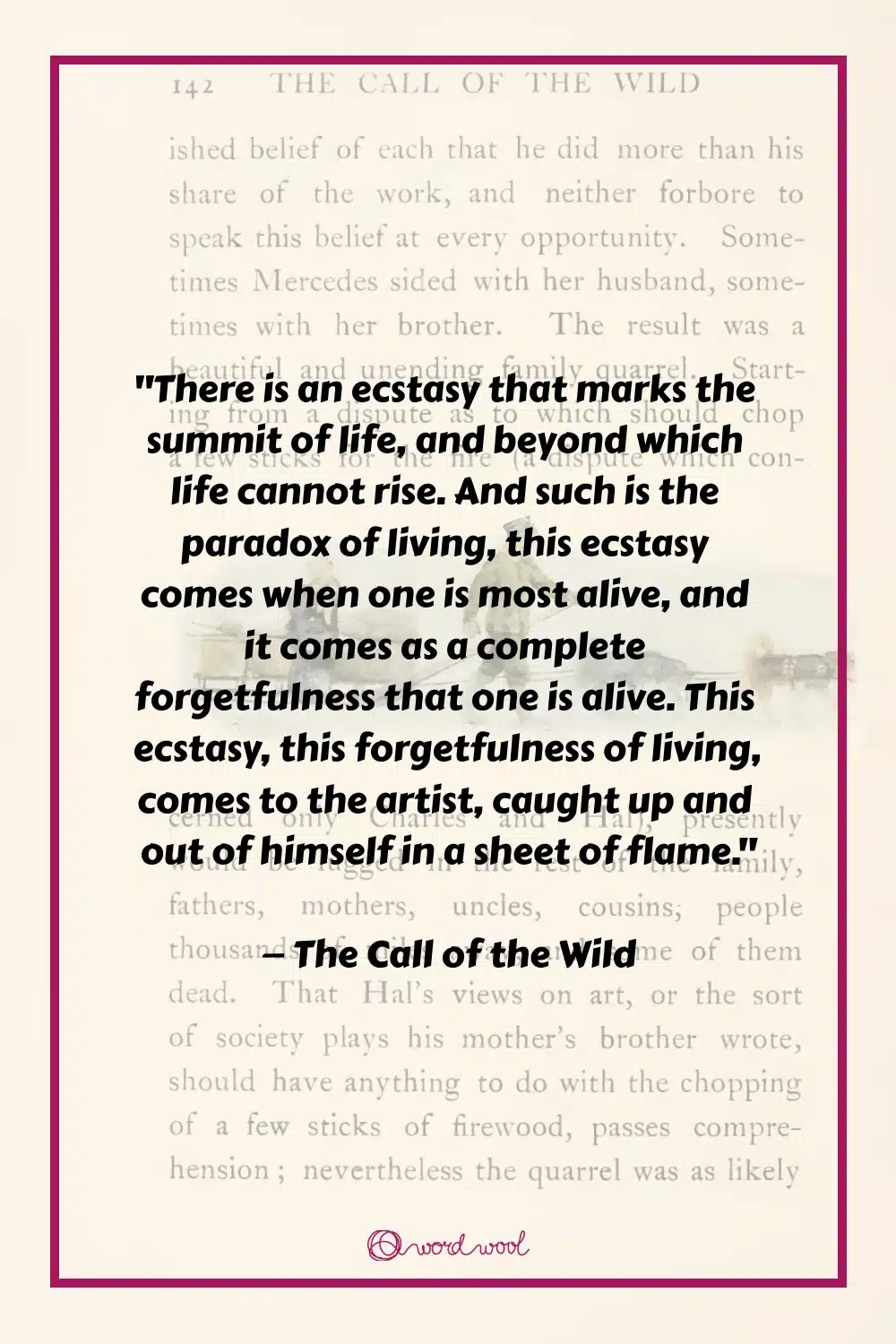
“There is an ecstasy that marks the summit of life, and beyond which life cannot rise. And such is the paradox of living, this ecstasy comes when one is most alive, and it comes as a complete forgetfulness that one is alive. This ecstasy, this forgetfulness of living, comes to the artist, caught up and out of himself in a sheet of flame.”
— The Call of the Wild
#10
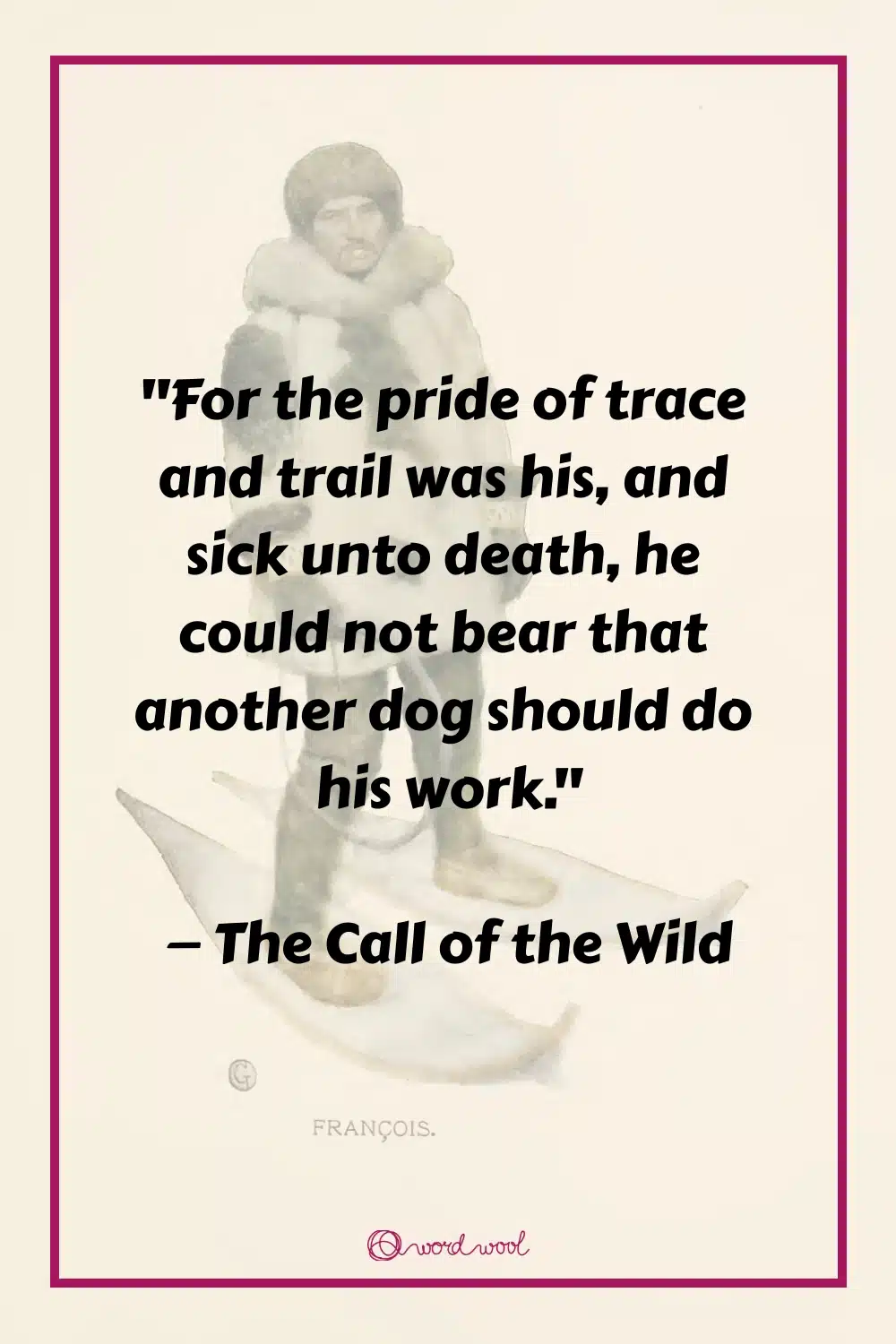
“For the pride of trace and trail was his, and sick unto death, he could not bear that another dog should do his work.”
— The Call of the Wild
#11
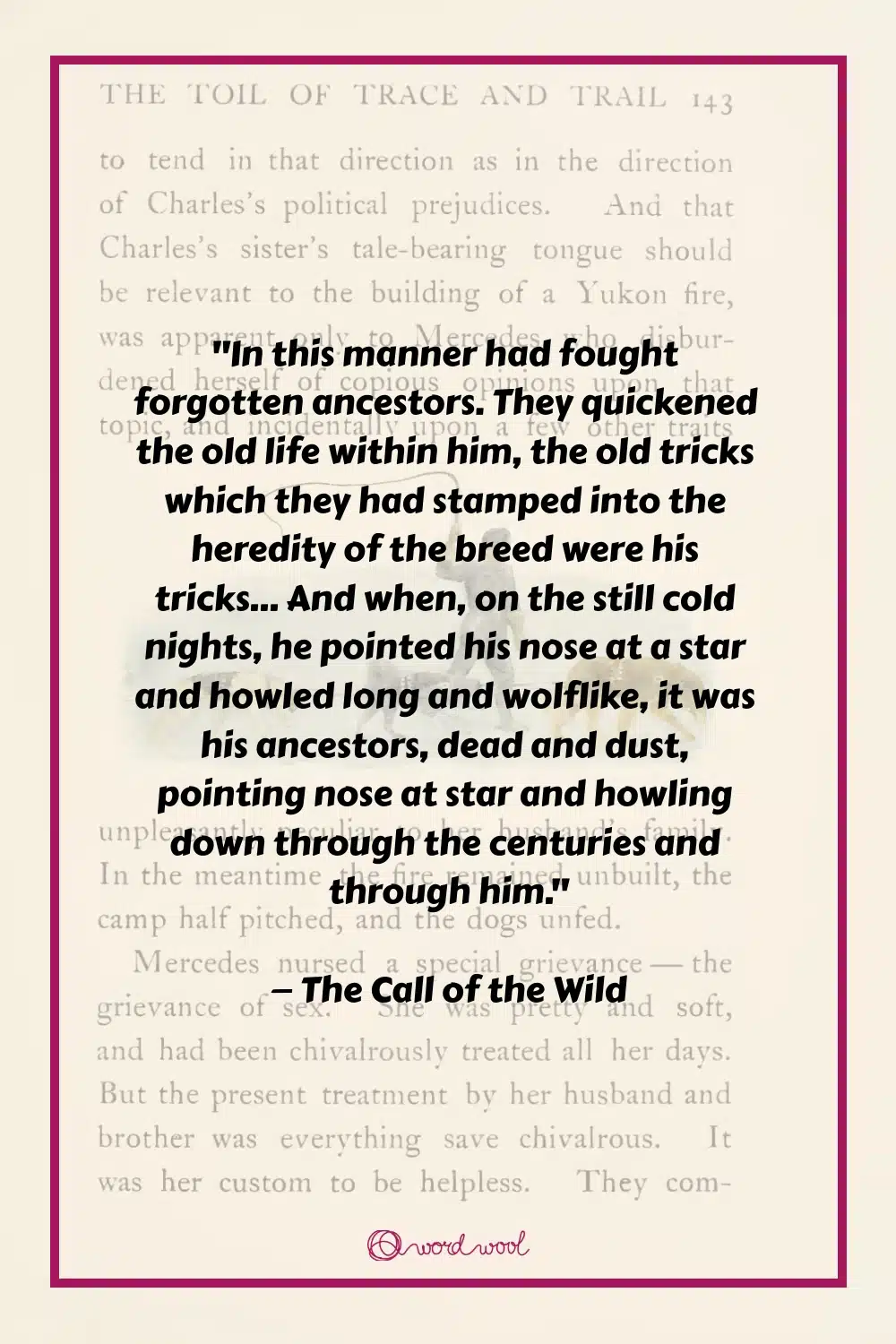
“In this manner had fought forgotten ancestors. They quickened the old life within him, the old tricks which they had stamped into the heredity of the breed were his tricks… And when, on the still cold nights, he pointed his nose at a star and howled long and wolflike, it was his ancestors, dead and dust, pointing nose at star and howling down through the centuries and through him.”
— The Call of the Wild
#12
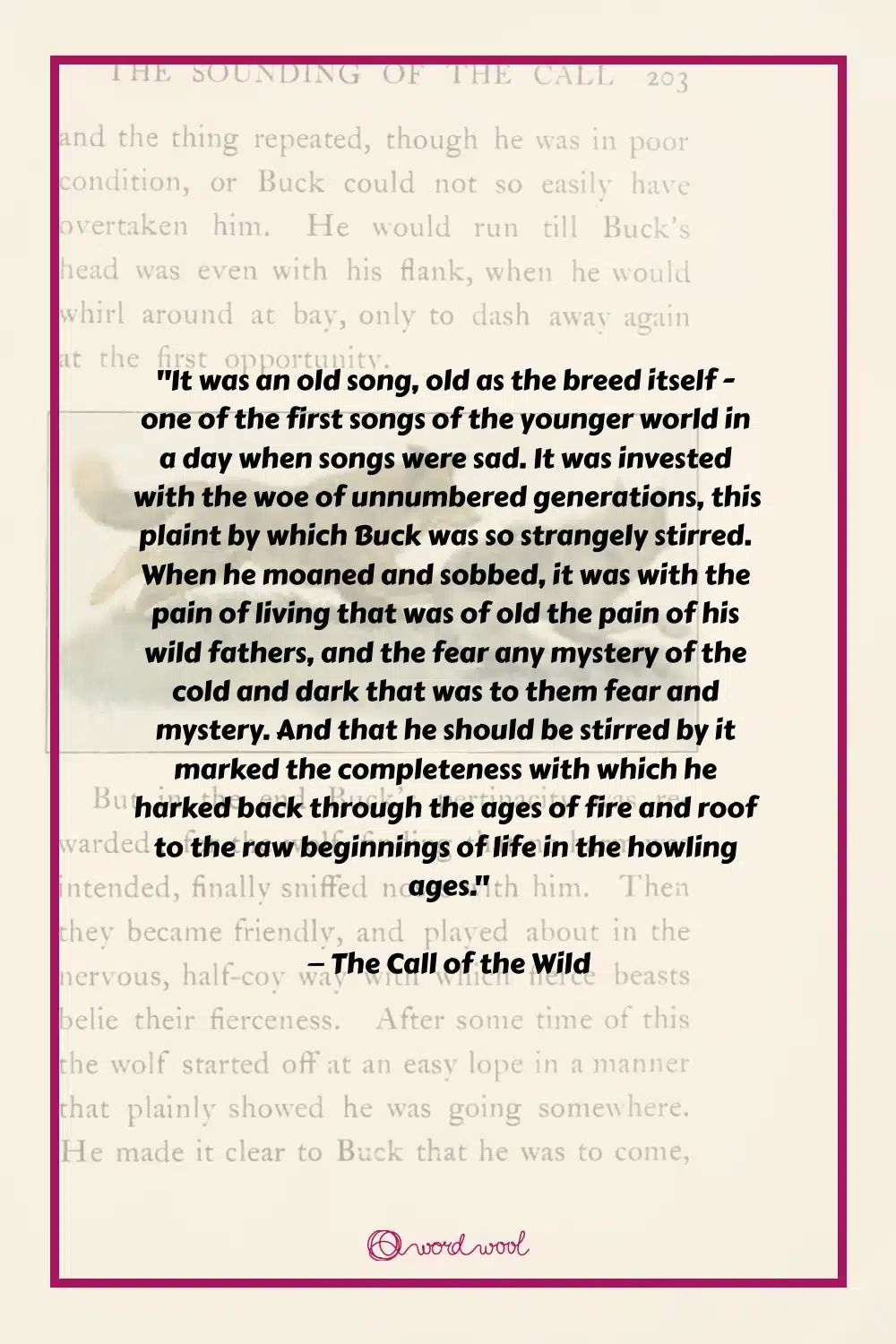
“It was an old song, old as the breed itself – one of the first songs of the younger world in a day when songs were sad. It was invested with the woe of unnumbered generations, this plaint by which Buck was so strangely stirred. When he moaned and sobbed, it was with the pain of living that was of old the pain of his wild fathers, and the fear any mystery of the cold and dark that was to them fear and mystery. And that he should be stirred by it marked the completeness with which he harked back through the ages of fire and roof to the raw beginnings of life in the howling ages.”
— The Call of the Wild
#13
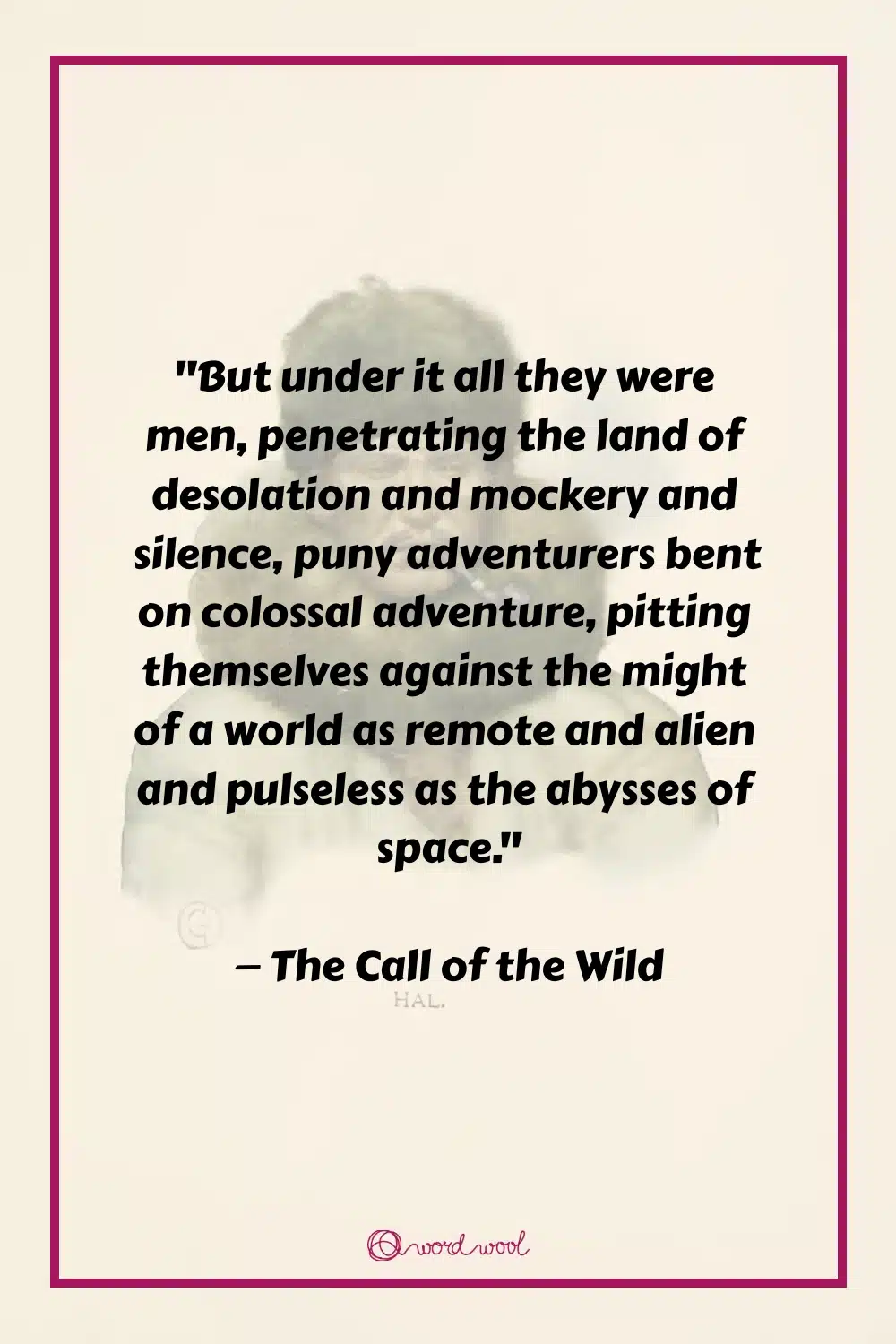
“But under it all they were men, penetrating the land of desolation and mockery and silence, puny adventurers bent on colossal adventure, pitting themselves against the might of a world as remote and alien and pulseless as the abysses of space.”
— The Call of the Wild
#14
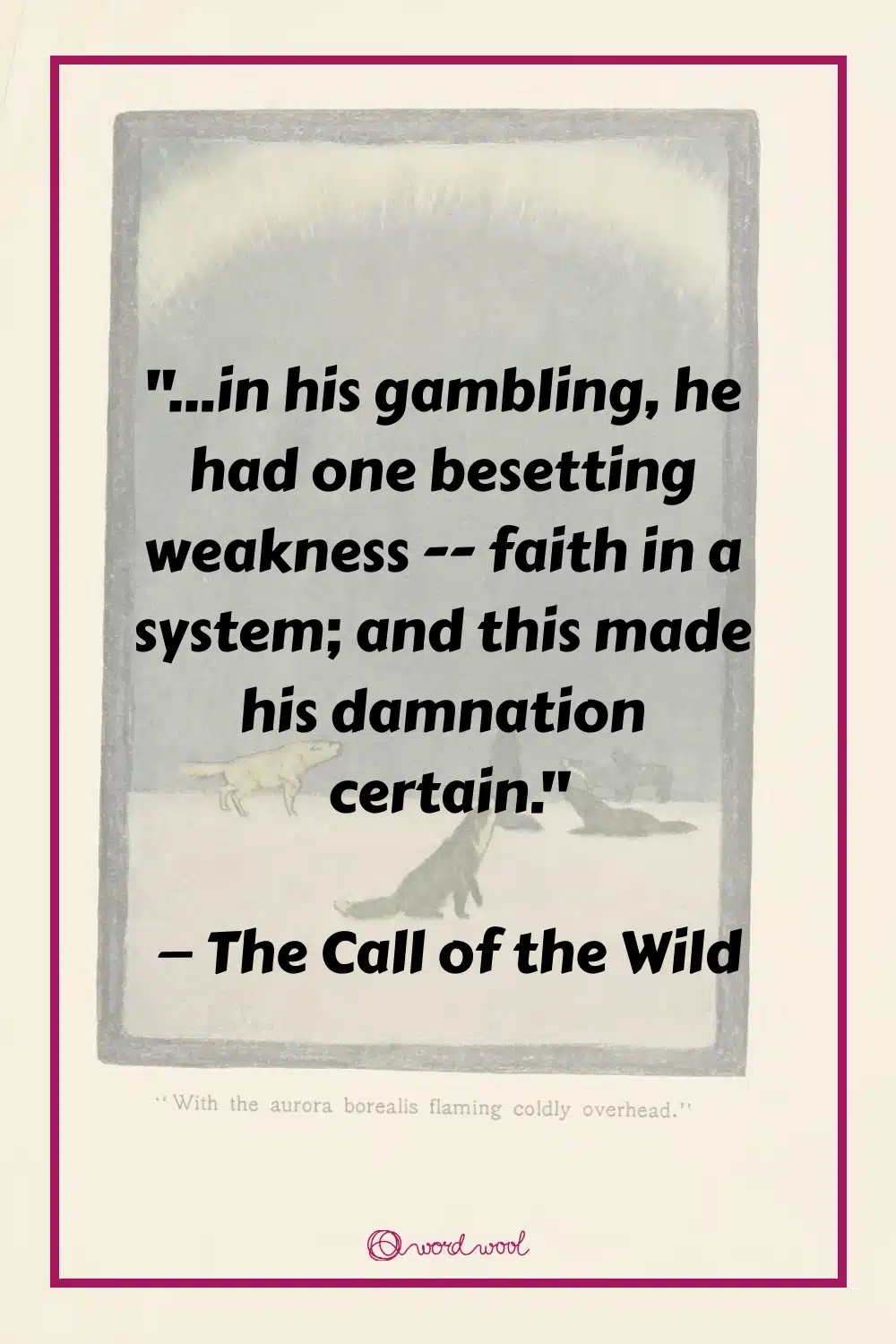
“…in his gambling, he had one besetting weakness — faith in a system; and this made his damnation certain.”
— The Call of the Wild
#15
“There was nothing the matter with them except they were dead tired. It was not the dead-tiredness that comes through brief and excessive effort, from which recovery is a matter of hours; but it was the dead-tiredness that comes through the slow and prolonged strength drainage of months of toil.”
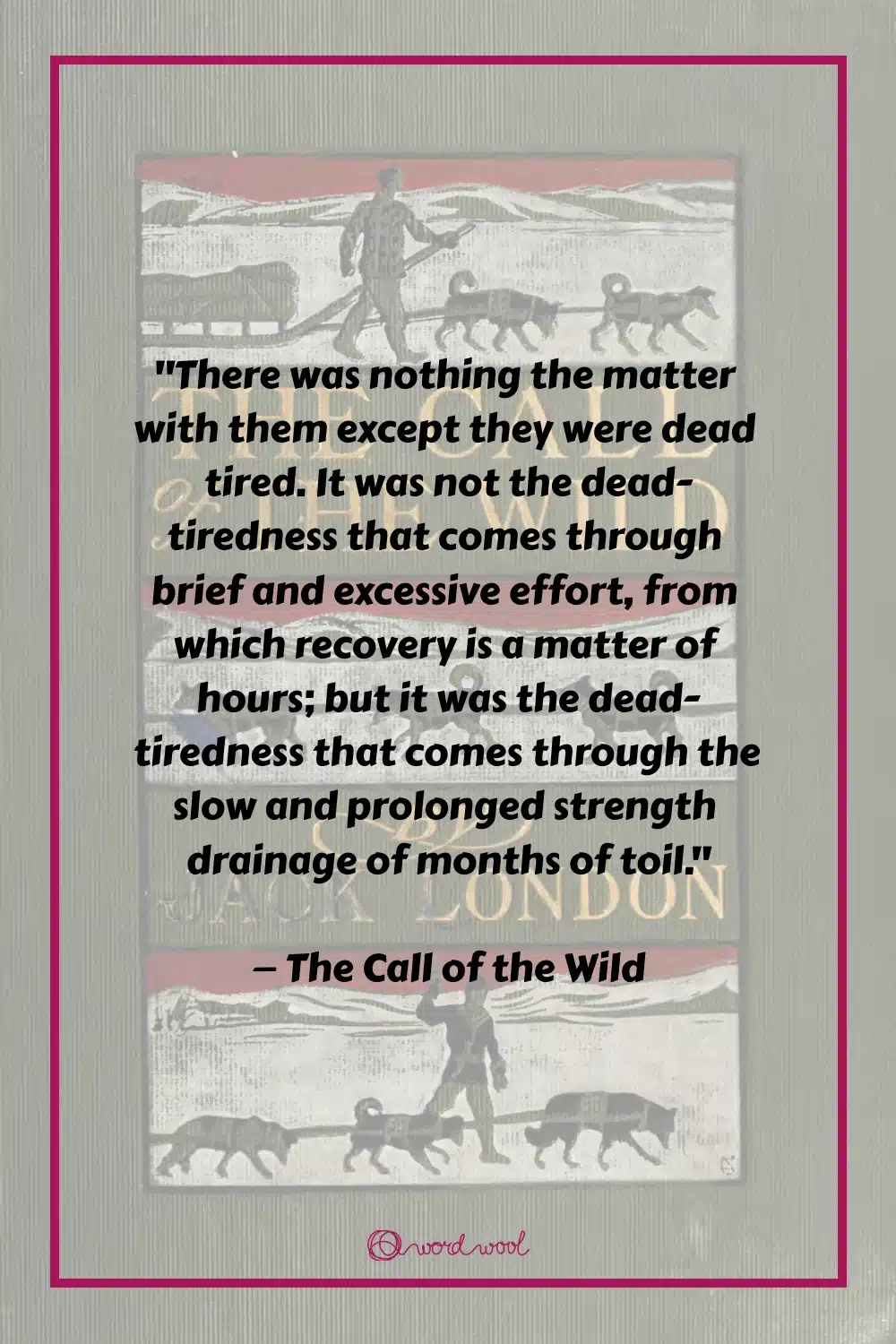
— The Call of the Wild
#16
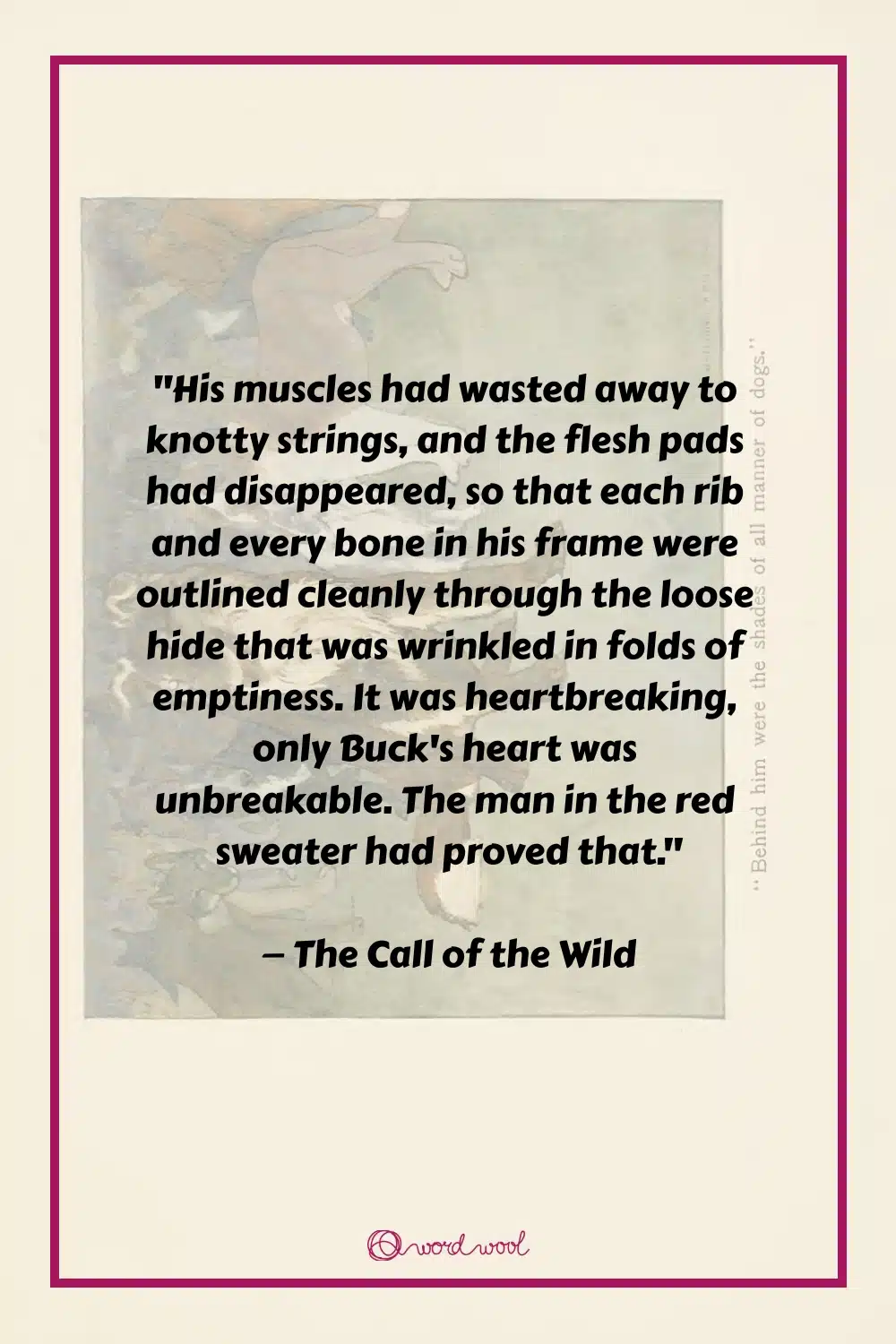
“His muscles had wasted away to knotty strings, and the flesh pads had disappeared, so that each rib and every bone in his frame were outlined cleanly through the loose hide that was wrinkled in folds of emptiness. It was heartbreaking, only Buck’s heart was unbreakable. The man in the red sweater had proved that.”
— The Call of the Wild
#17
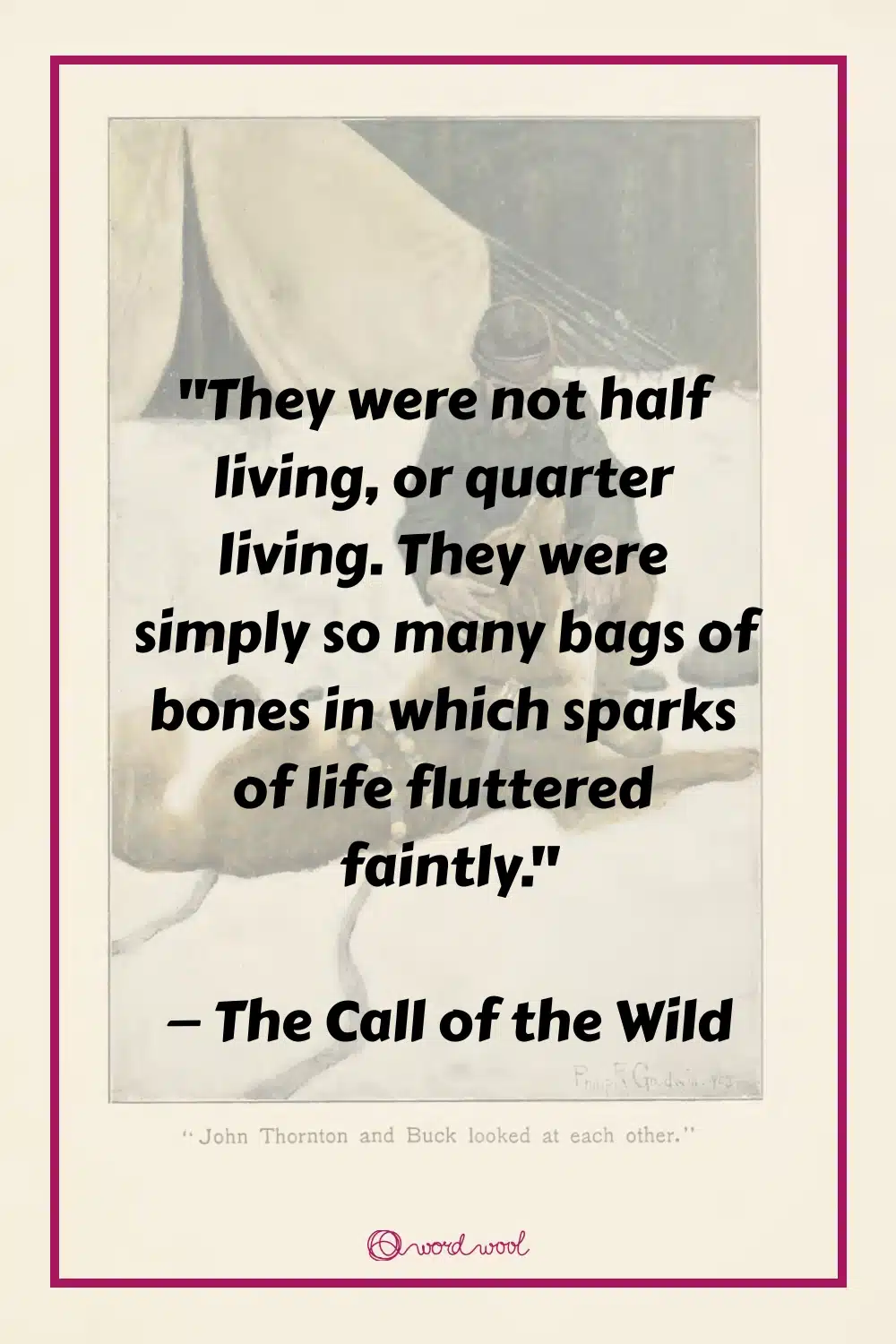
“They were not half living, or quarter living. They were simply so many bags of bones in which sparks of life fluttered faintly.”
#18
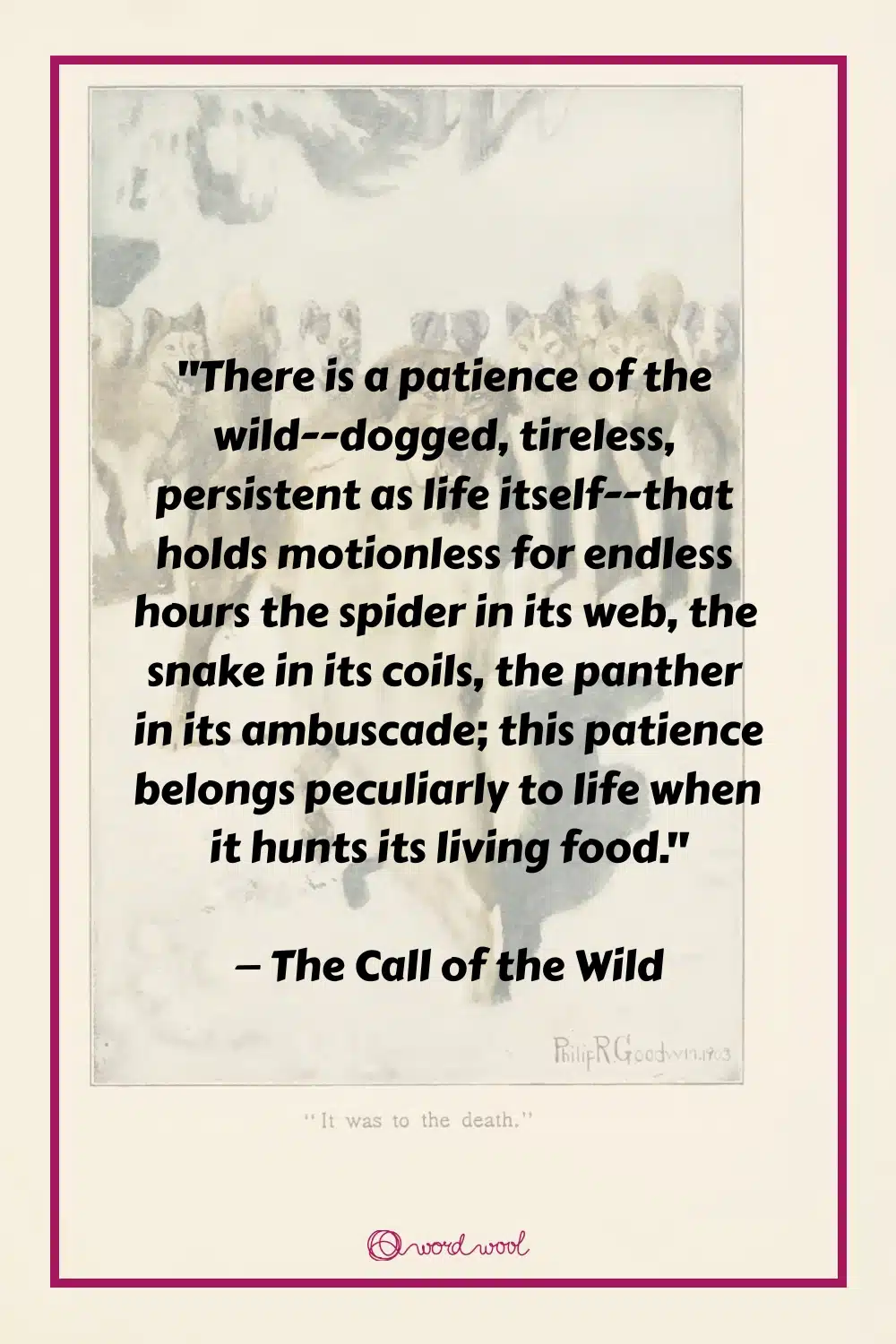
“There is a patience of the wild–dogged, tireless, persistent as life itself–that holds motionless for endless hours the spider in its web, the snake in its coils, the panther in its ambuscade; this patience belongs peculiarly to life when it hunts its living food.”
— The Call of the Wild
#19
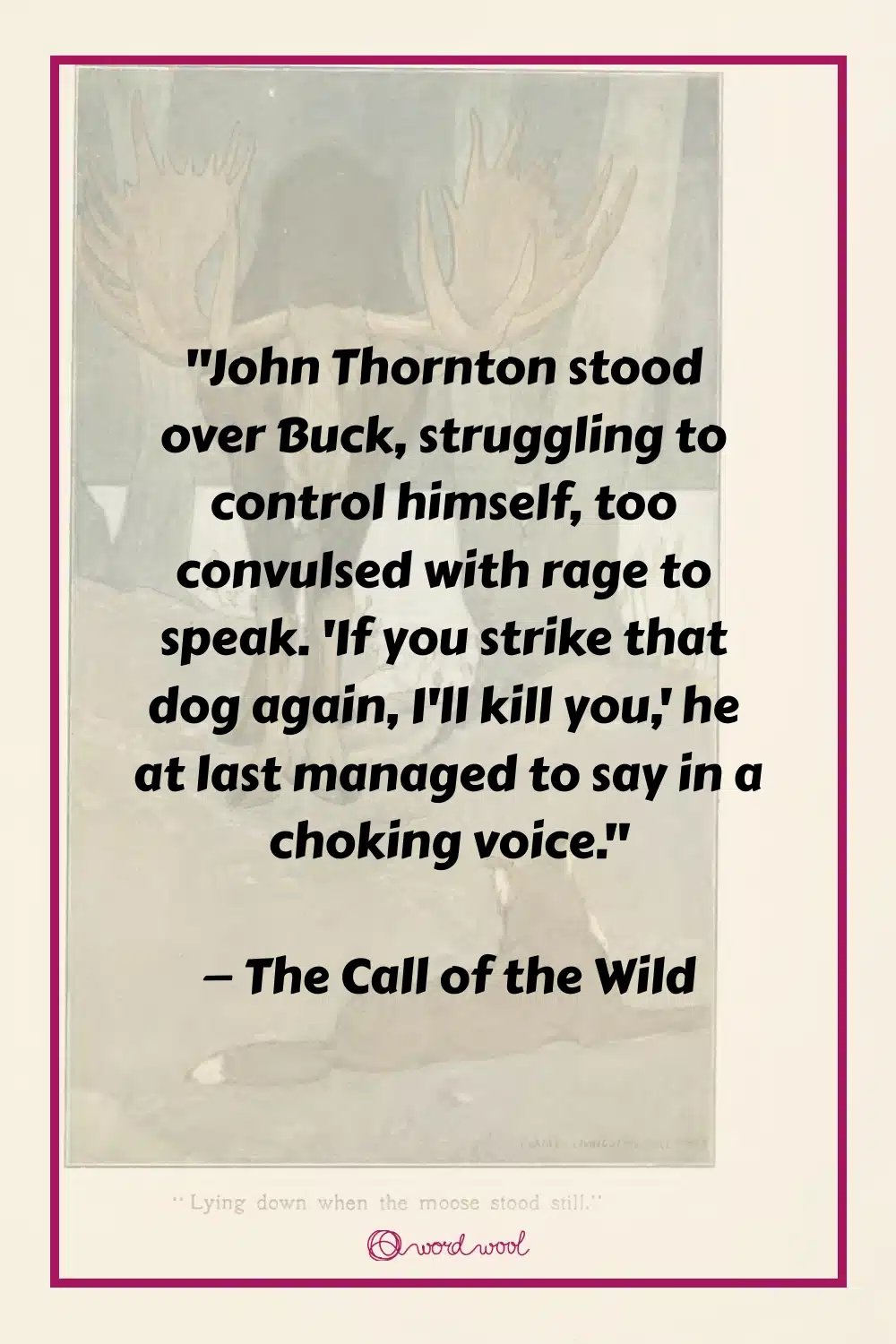
“John Thornton stood over Buck, struggling to control himself, too convulsed with rage to speak. ‘If you strike that dog again, I’ll kill you,’ he at last managed to say in a choking voice.”
— The Call of the Wild
#20
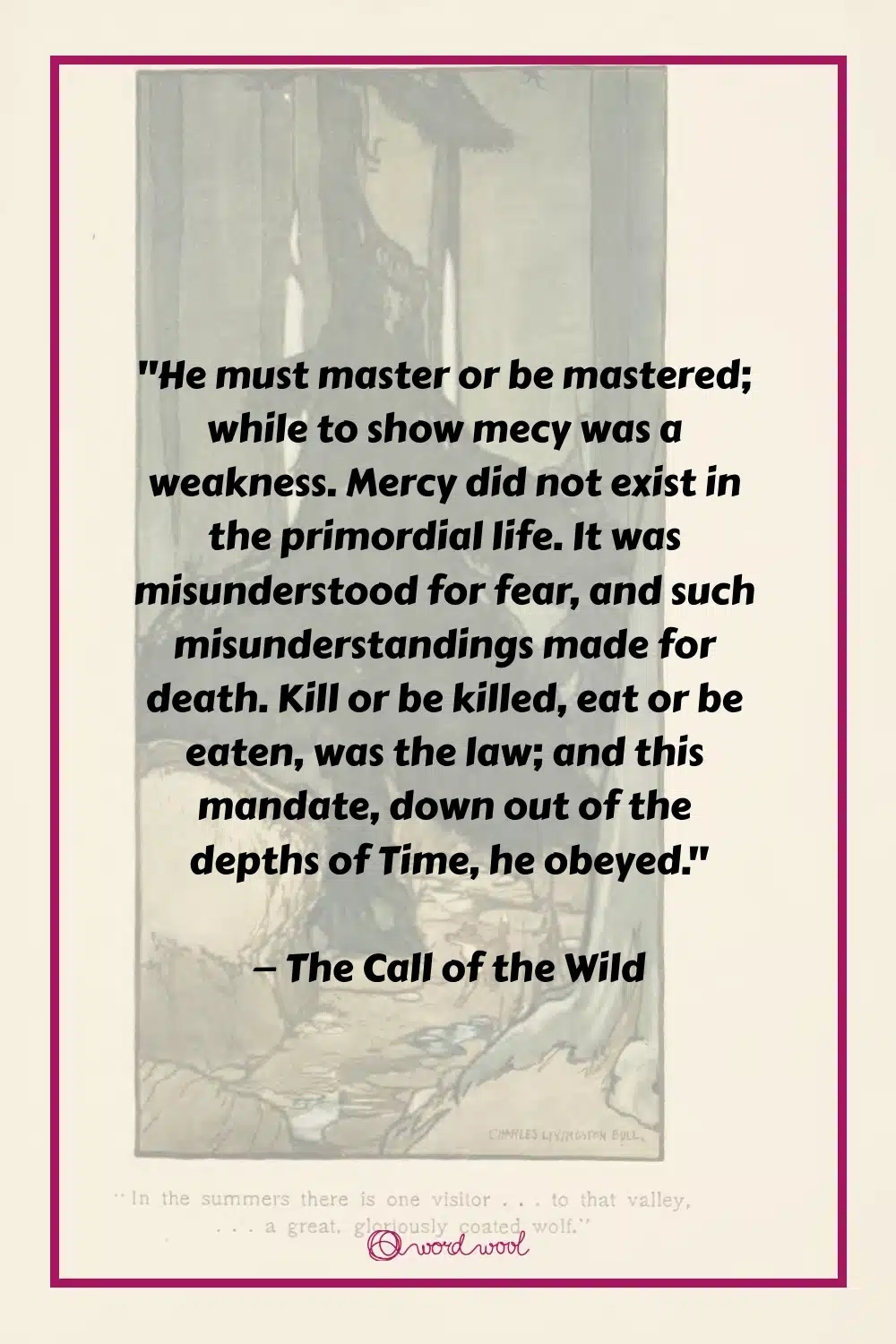
“He must master or be mastered; while to show mecy was a weakness. Mercy did not exist in the primordial life. It was misunderstood for fear, and such misunderstandings made for death. Kill or be killed, eat or be eaten, was the law; and this mandate, down out of the depths of Time, he obeyed.”
— The Call of the Wild
#21
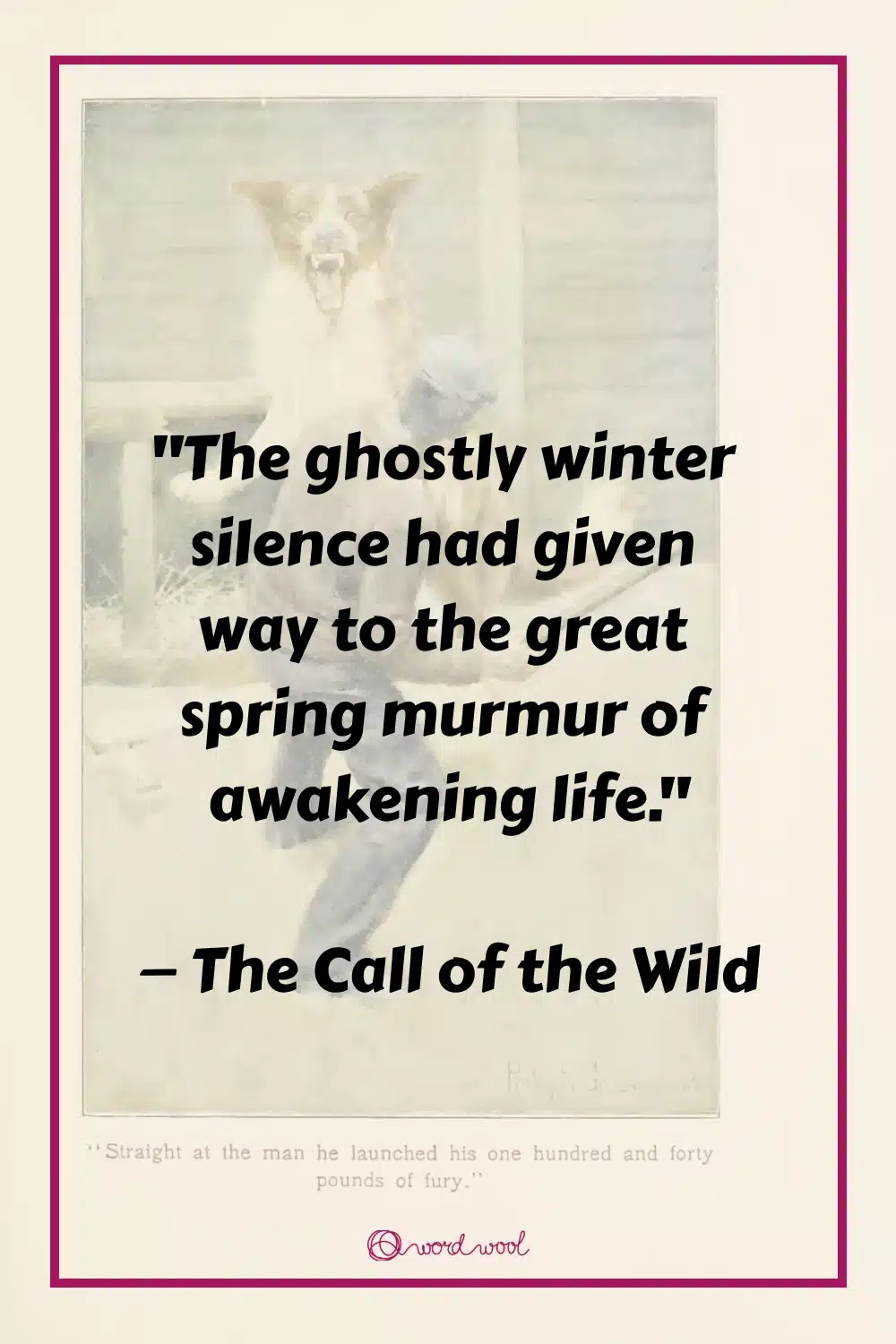
“The ghostly winter silence had given way to the great spring murmur of awakening life.”
— The Call of the Wild
#22
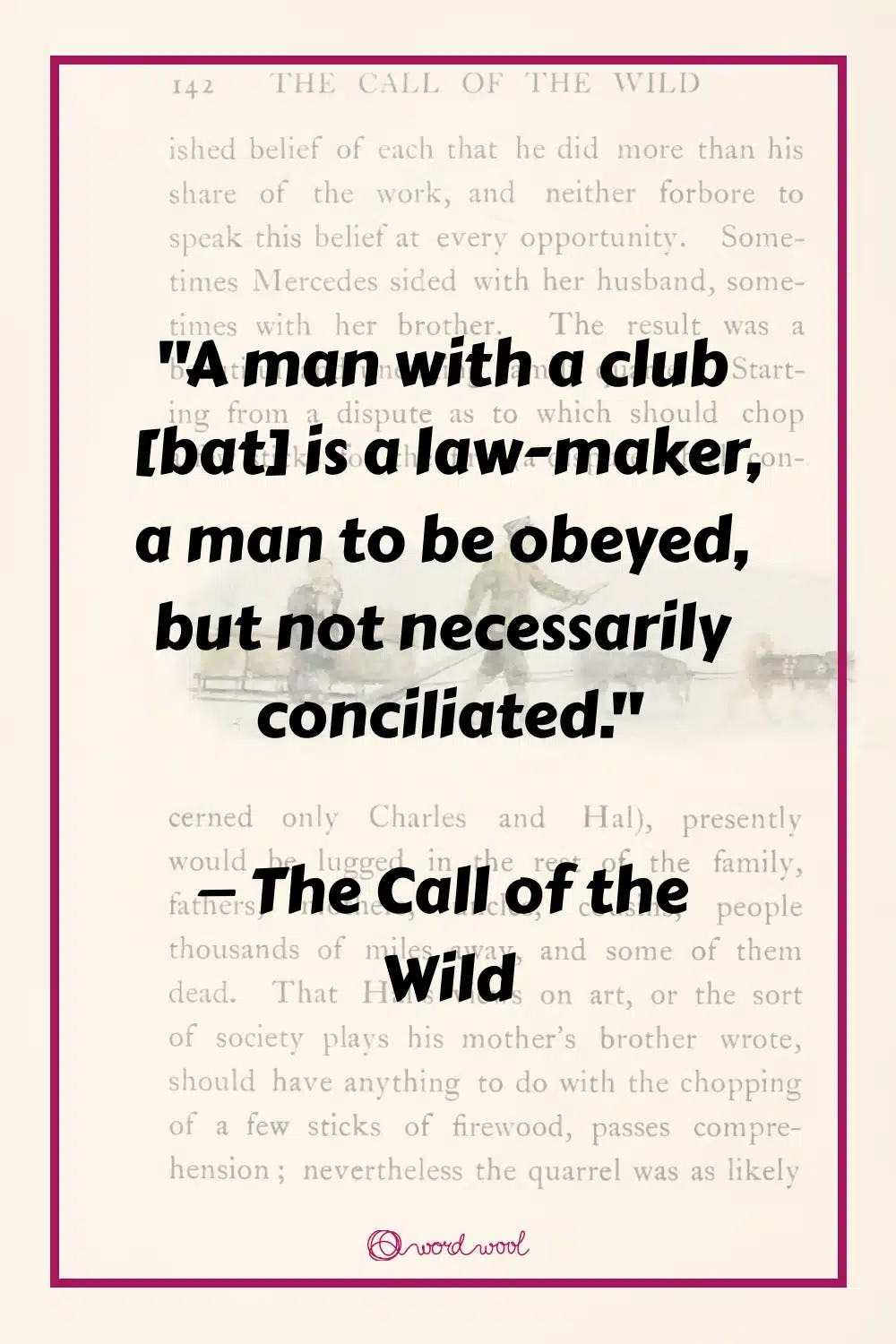
“A man with a club [bat] is a law-maker, a man to be obeyed, but not necessarily conciliated.”
— The Call of the Wild
#23
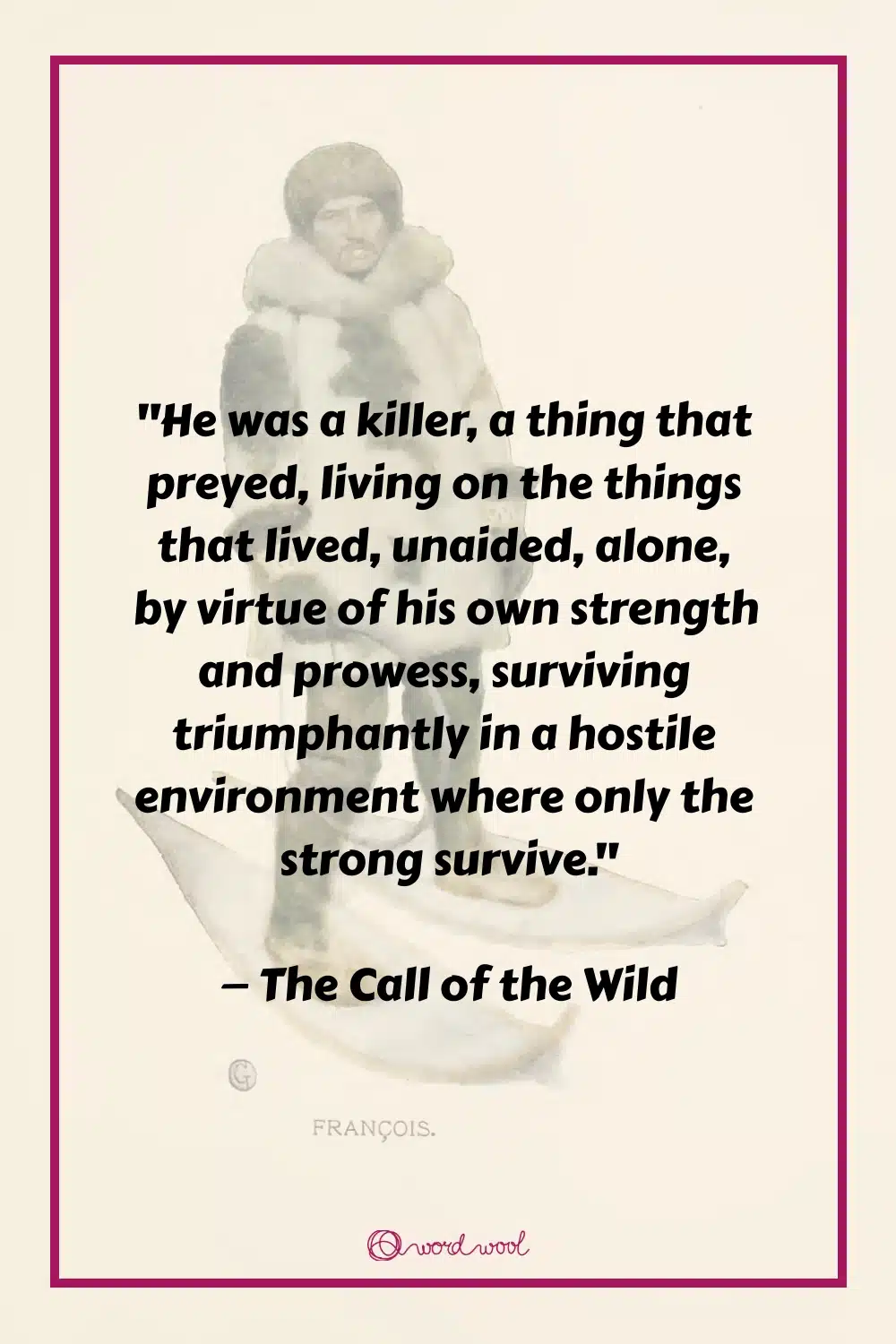
“He was a killer, a thing that preyed, living on the things that lived, unaided, alone, by virtue of his own strength and prowess, surviving triumphantly in a hostile environment where only the strong survive.”
— The Call of the Wild
#24
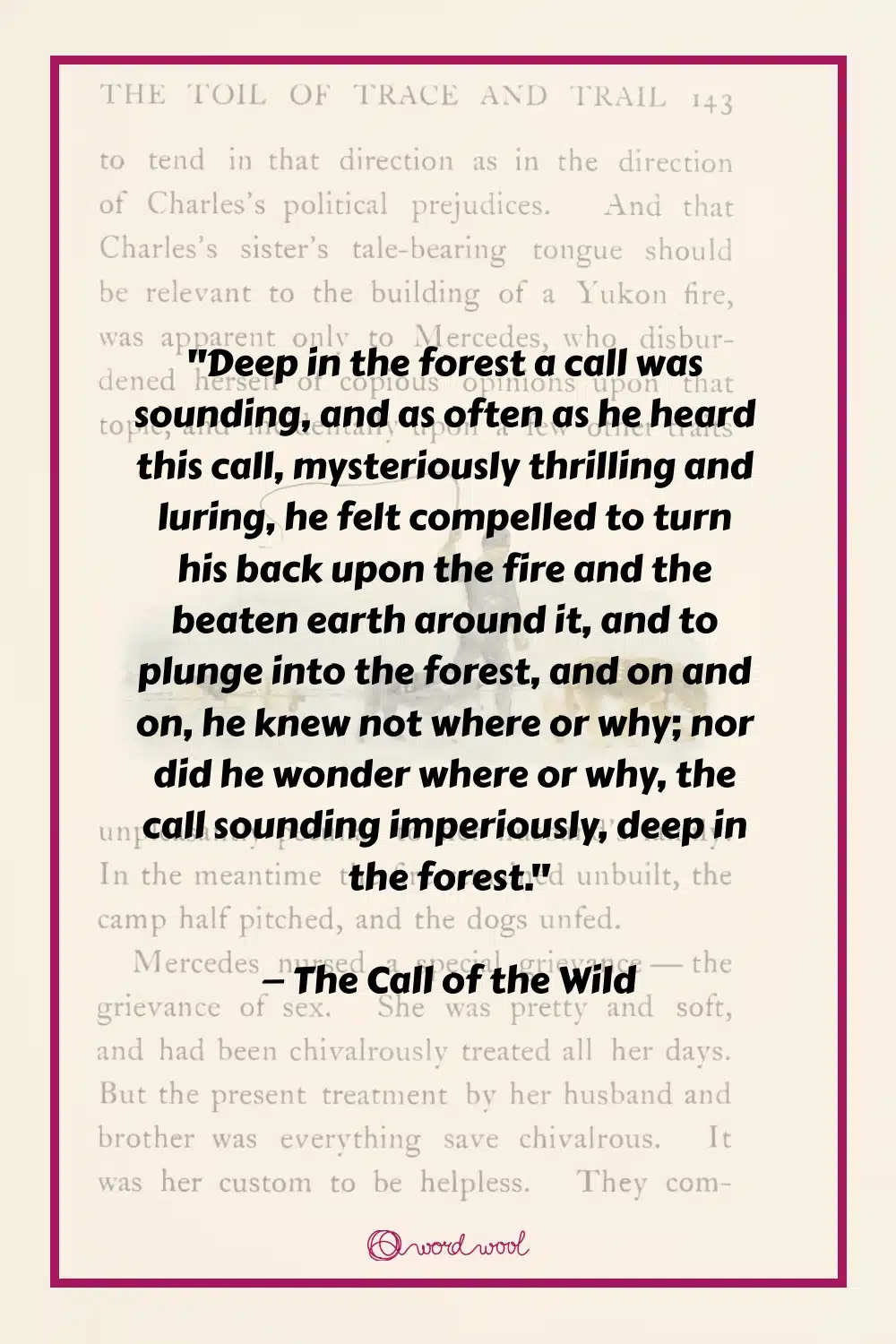
“Deep in the forest a call was sounding, and as often as he heard this call, mysteriously thrilling and luring, he felt compelled to turn his back upon the fire and the beaten earth around it, and to plunge into the forest, and on and on, he knew not where or why; nor did he wonder where or why, the call sounding imperiously, deep in the forest.”
— The Call of the Wild
#25
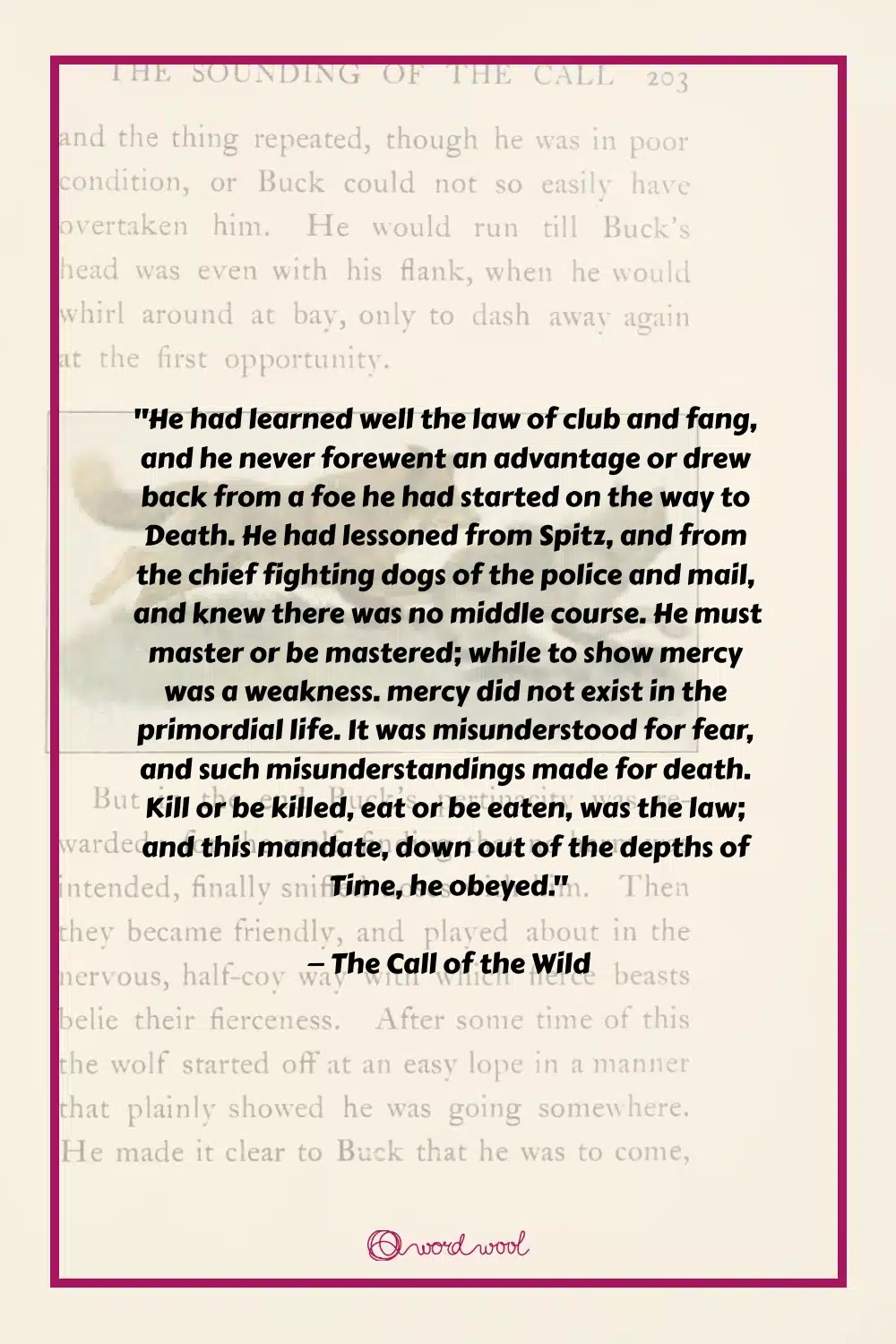
“He had learned well the law of club and fang, and he never forewent an advantage or drew back from a foe he had started on the way to Death. He had lessoned from Spitz, and from the chief fighting dogs of the police and mail, and knew there was no middle course. He must master or be mastered; while to show mercy was a weakness. mercy did not exist in the primordial life. It was misunderstood for fear, and such misunderstandings made for death. Kill or be killed, eat or be eaten, was the law; and this mandate, down out of the depths of Time, he obeyed.”
— The Call of the Wild
#26
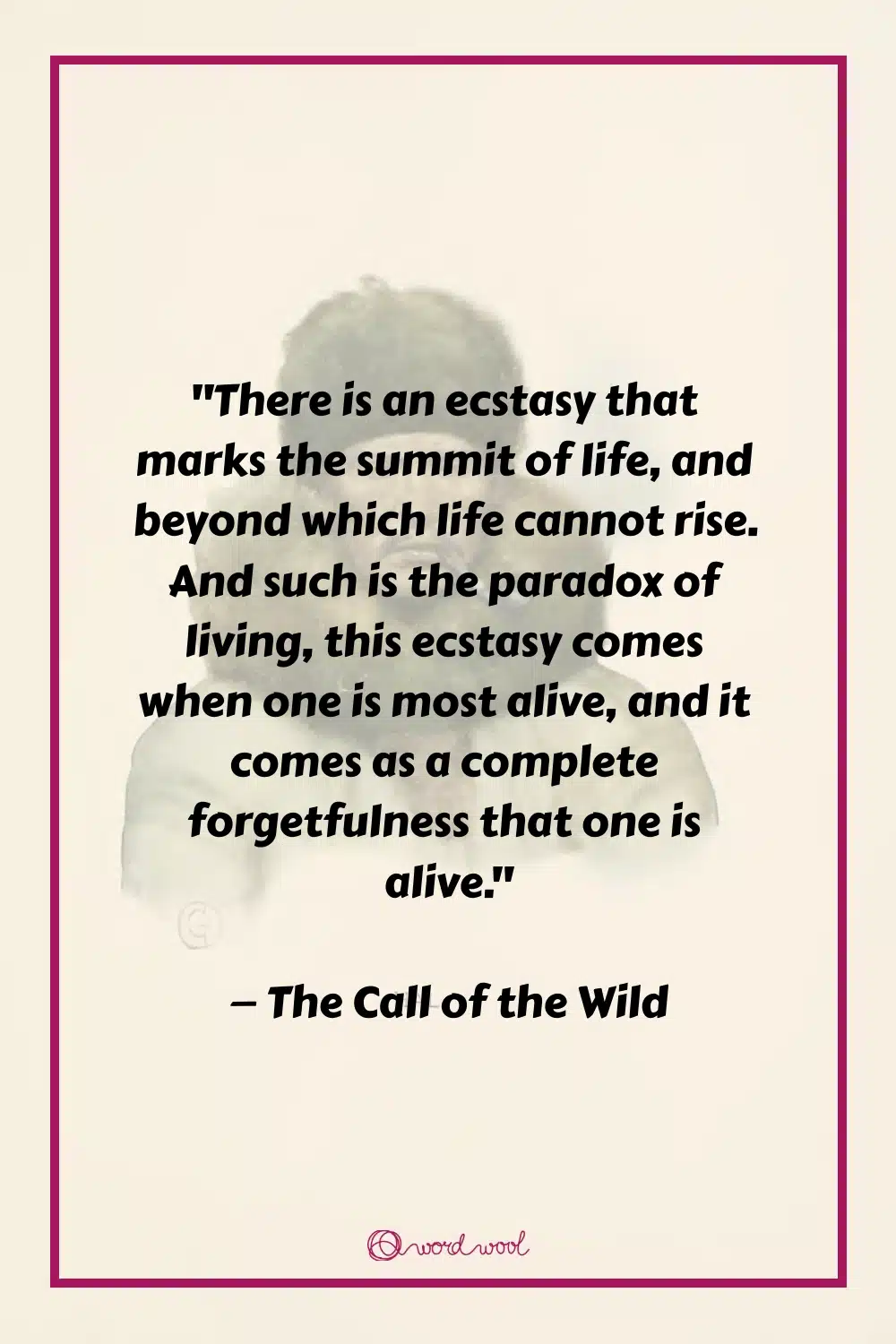
“There is an ecstasy that marks the summit of life, and beyond which life cannot rise. And such is the paradox of living, this ecstasy comes when one is most alive, and it comes as a complete forgetfulness that one is alive.”
— The Call of the Wild
#27
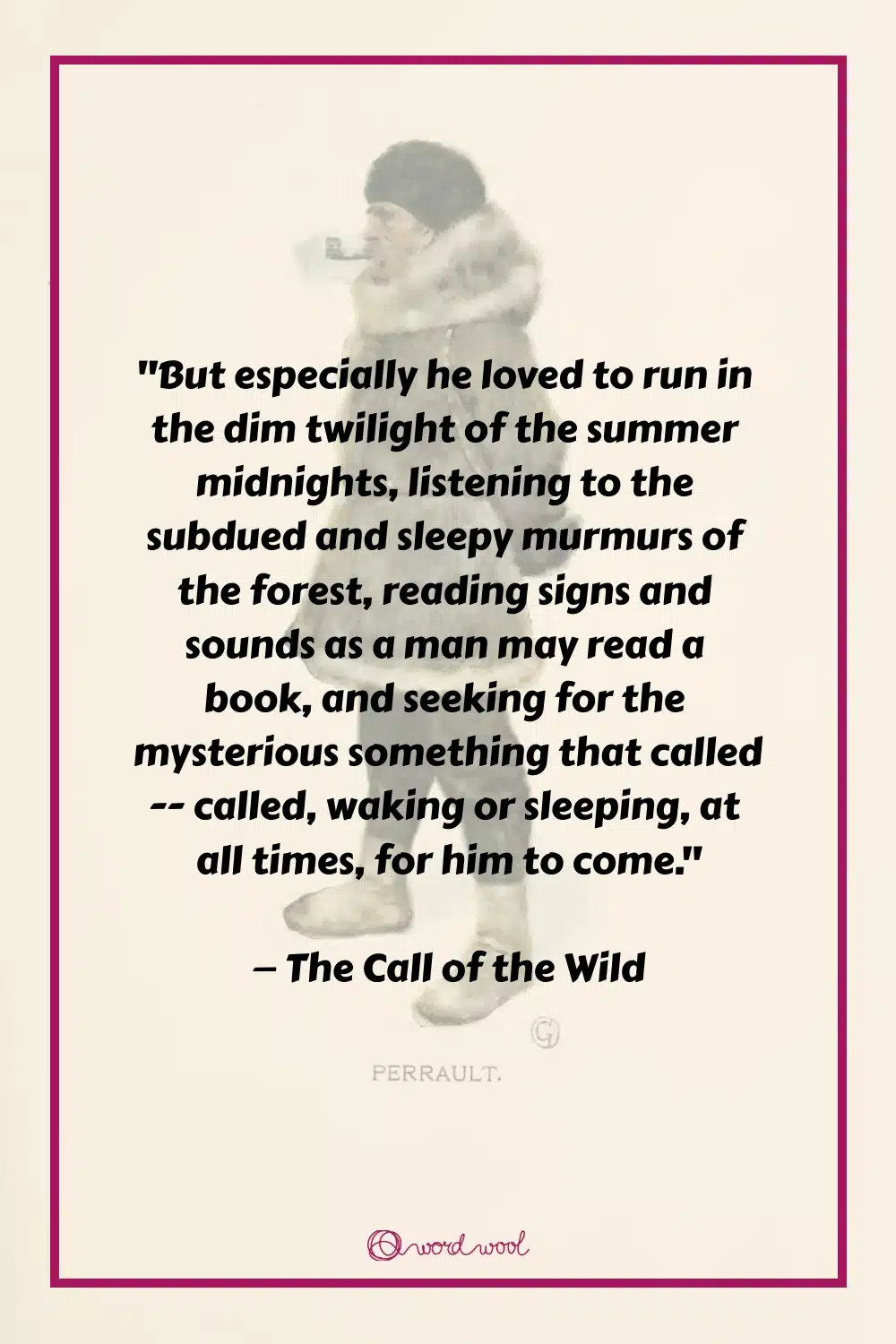
“But especially he loved to run in the dim twilight of the summer midnights, listening to the subdued and sleepy murmurs of the forest, reading signs and sounds as a man may read a book, and seeking for the mysterious something that called — called, waking or sleeping, at all times, for him to come.”
— The Call of the Wild
#28
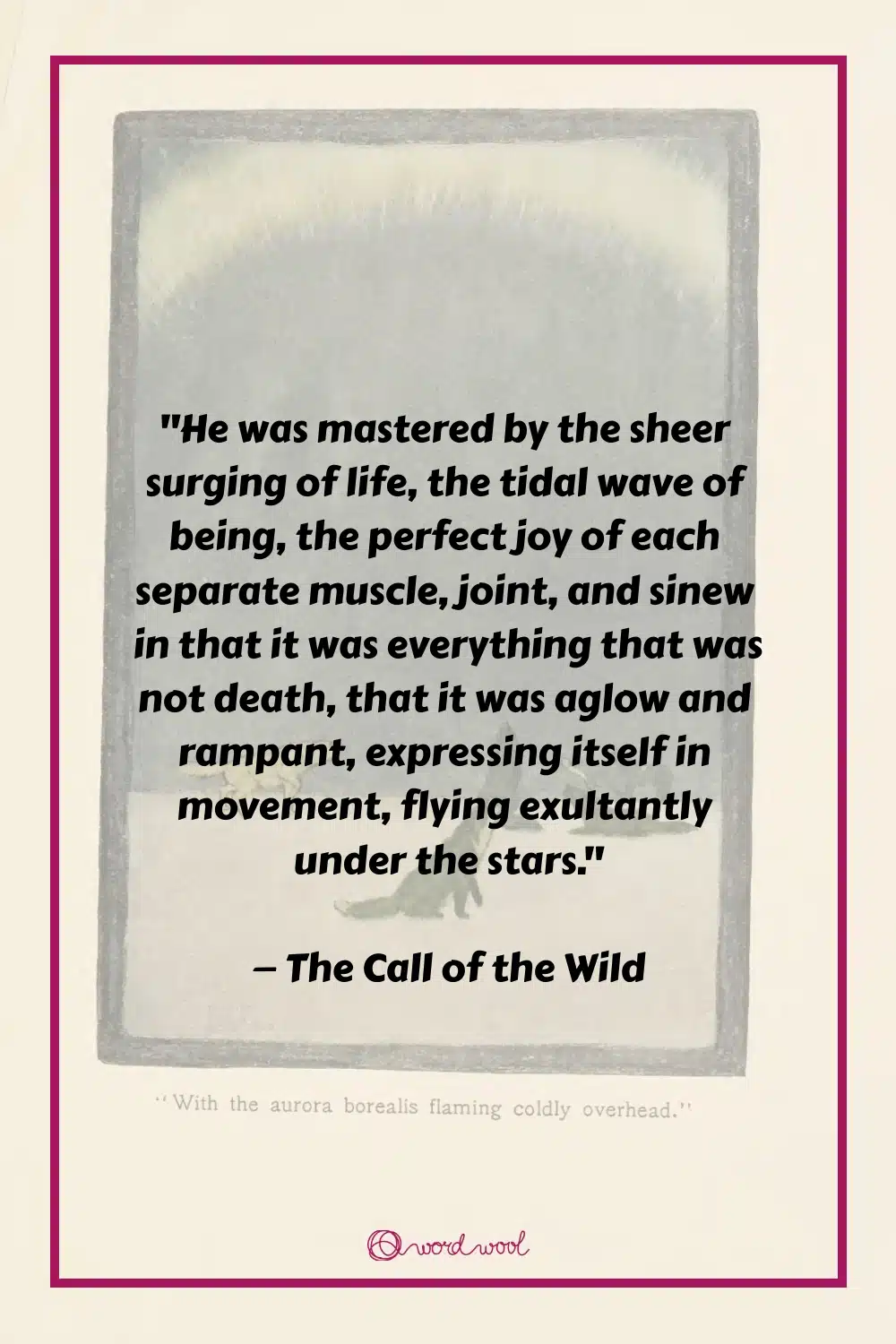
“He was mastered by the sheer surging of life, the tidal wave of being, the perfect joy of each separate muscle, joint, and sinew in that it was everything that was not death, that it was aglow and rampant, expressing itself in movement, flying exultantly under the stars.”
#29
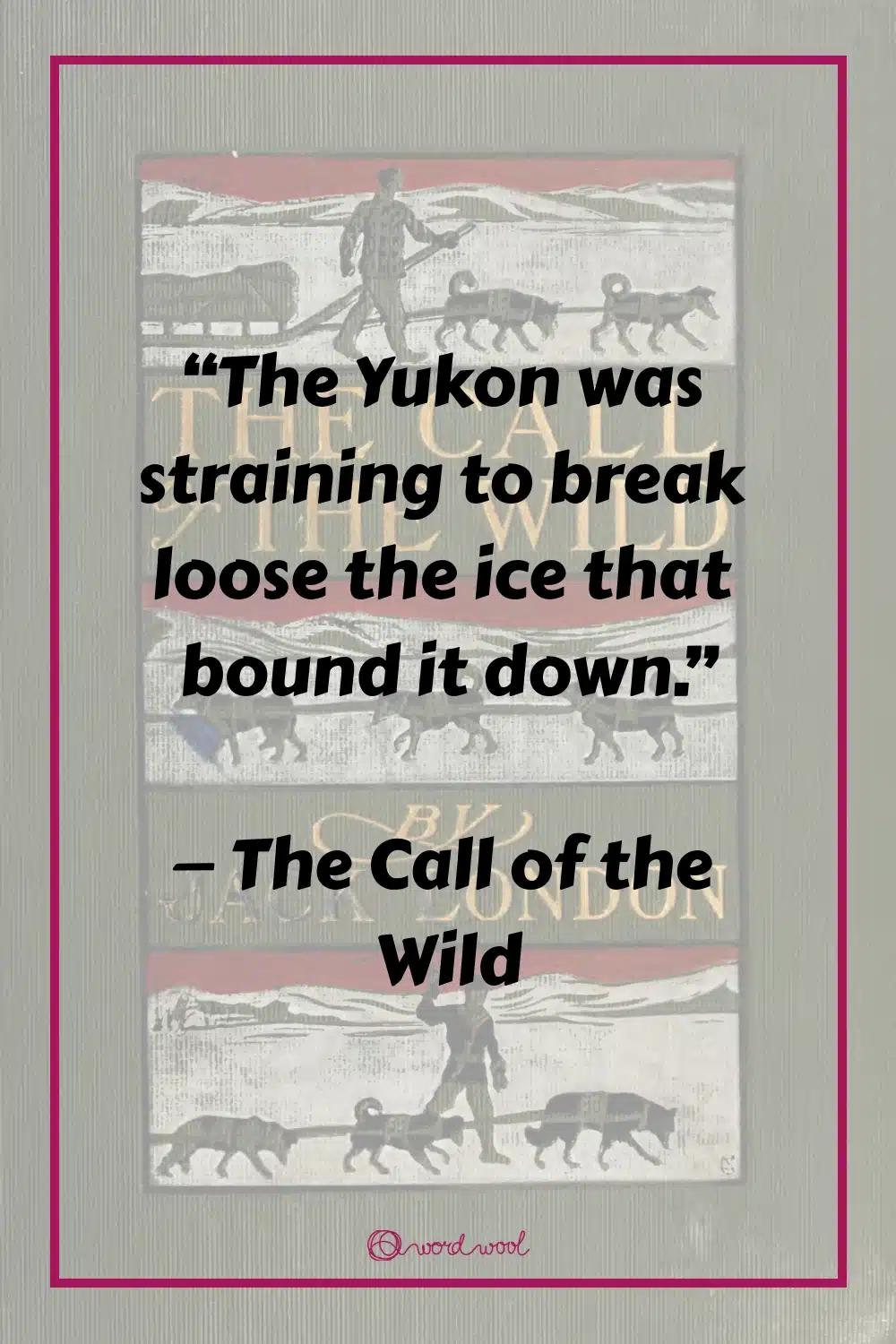
“The Yukon was straining to break loose the ice that bound it down.”
— The Call of the Wild
#30
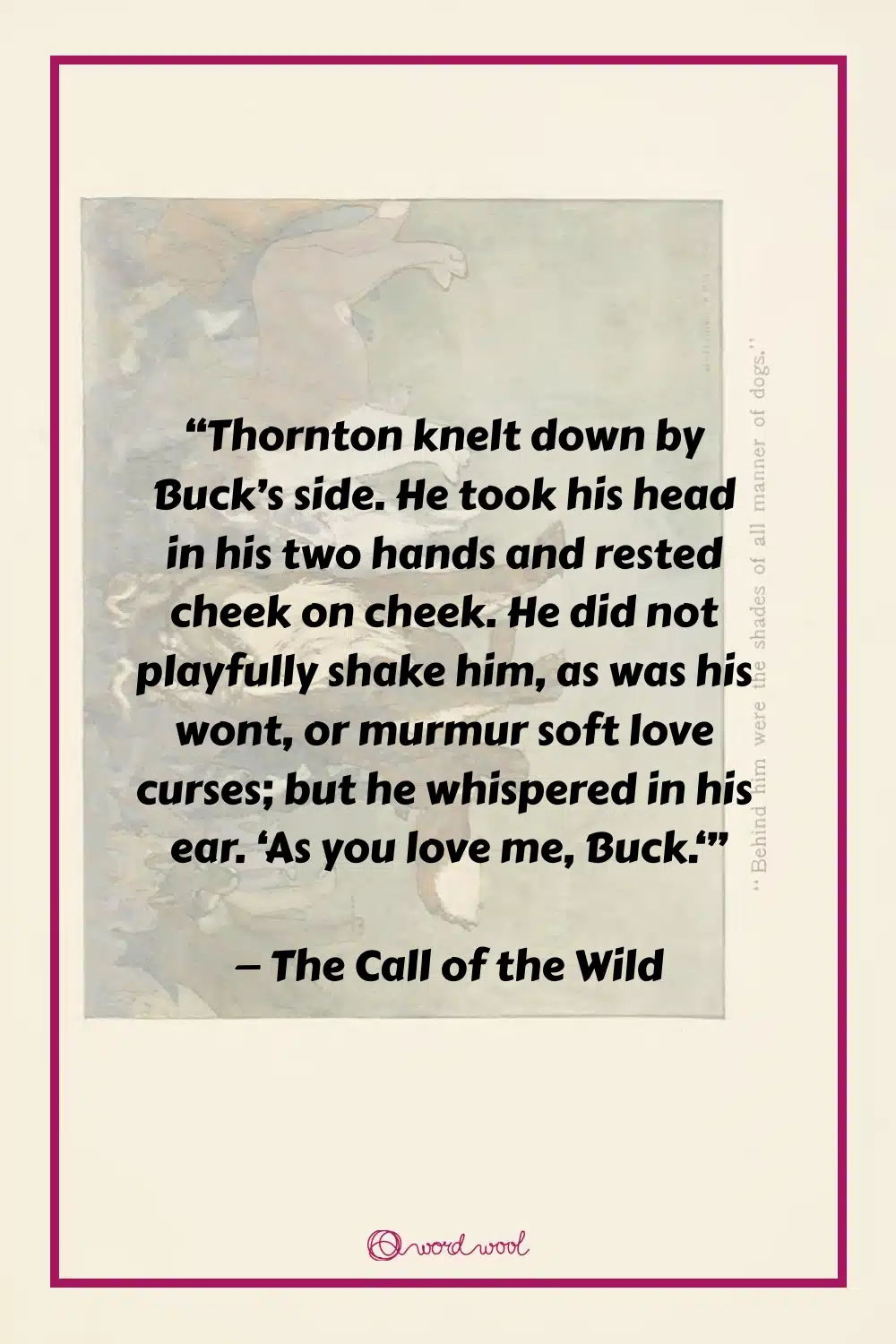
“Thornton knelt down by Buck’s side. He took his head in his two hands and rested cheek on cheek. He did not playfully shake him, as was his wont, or murmur soft love curses; but he whispered in his ear. ‘As you love me, Buck.‘”
— The Call of the Wild
#31
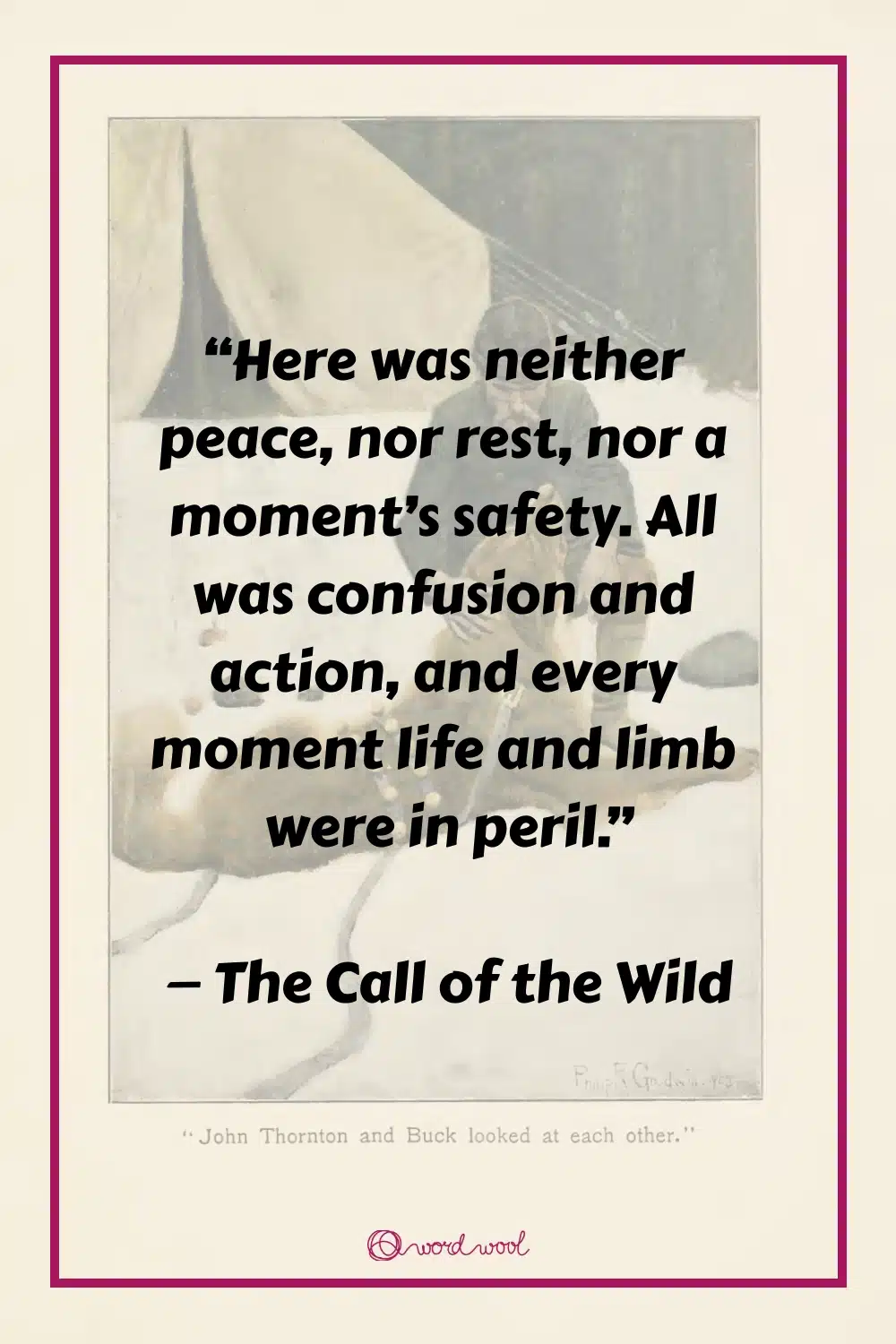
“Here was neither peace, nor rest, nor a moment’s safety. All was confusion and action, and every moment life and limb were in peril.”
— The Call of the Wild
#32
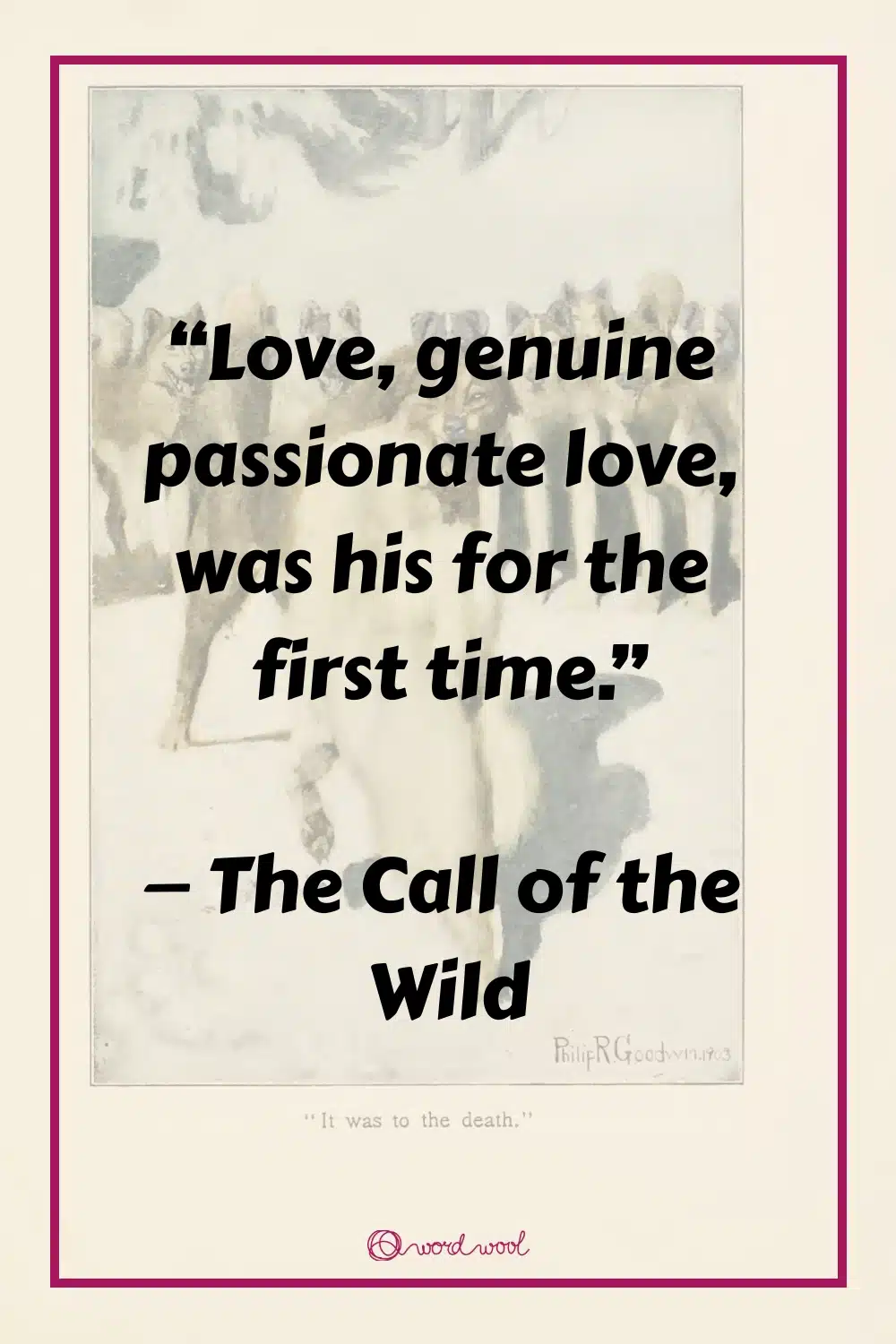
“Love, genuine passionate love, was his for the first time.”
— The Call of the Wild

